Creating the Environment


Empowering Student Leaders for Success
CONFERENCE
Snapshots of the 2024
PLUS: ANewSpotlightonYOU! FMEA Steel Band Festival JuneHinckleyScholarship
That Controls Us

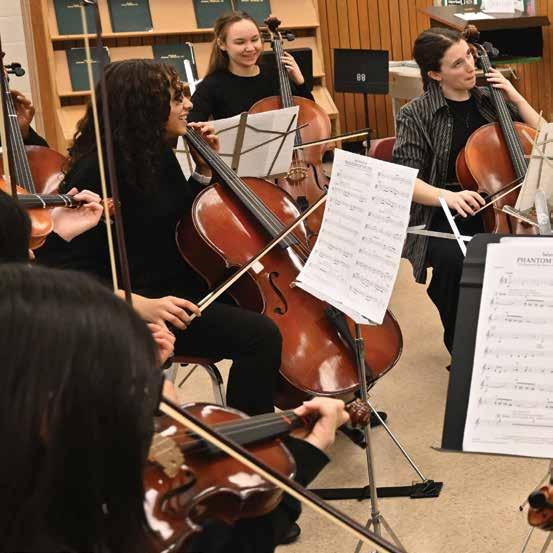











Kathleen D. Sanz, PhD
FL 32301 (850)878-6844 or (800) 301-3632 (kdsanz@fmea.org)
Editor-in-Chief
Kelly Miller, DMA University of Central Florida 12488 Centaurus Blvd. Orlando, FL 32816-8009 (407)823-4545 (kelly.miller@ucf.edu)
Editorial Committee
Terice Allen (850)245-8700, Tallahassee (tallen1962@hotmail.com)
Judy Arthur, PhD Florida State University, KMU 222 (850)644-3005 (jrarthur@fsu.edu)
William Bauer, PhD
University of Florida, Gainesville (352)273-3182; (wbauer@ufl.edu)
Alice-Ann Darrow, PhD College of Music, FSU, Tallahassee (850)645-1438; (aadarrow@fsu.edu)
Jeanne Reynolds (jeannewrey@gmail.com)
John K. Southall, PhD Indian River State College, Fort Pierce (772)462-7810; (johnsouthall@fmea.org) Advertising
FL 32301 (850)878-6844
Febr uary/March 2024 3
Director Florida Music Education Association
Executive
Hinckley
Fine Arts Education 402
Tallahassee,
Center for
Office Plaza
Valeria Anderson (val@fmea.org)
Tallahassee,
Official FMEA and FMD Photographers Bob O’Lary Amanda Crawford Art Director & Production Manager Lori Danello Roberts LDR Design Inc. (lori@flmusiced.org) Circulation & Copy Manager Valeria Anderson, (800) 301-3632 Copy Editor Susan Trainor Contents February/March 2024 Volume 77 • Number 6 FEATURES DEPARTMENTS CONFERENCE President’s Message 4 Advertiser Index 5 Advocacy Report 6 Immediate Impact 8 2023-2024 FMEA Donors 42 Component News 45 FSMA Unlocking the Potential .......... 10 Snapshots from the 2024 Conference .... 11-15 Congratulations to Award Winners ..... 16-31 2024 Hall of Fame Inductee ............ 32 June M. Hinckley Music Education Scholarship ........... 33 Empowering Student Leaders for Success ....................... 34 Cultivating Leadership, People Skills, and Autonomy in Band Programs Creating the Environment That Controls Us ................... 38 2024 Steel Band Festival .............. 4 4 Crossover Festival .................. 47 Teach Music Florida Coalition 2024 ....... 55 Research Puzzles 50 Committee Reports 52 Corporate Partners 58 Academic Partners 60 Executive Director’s Notes 62 Officers and Directors 63
Sales
402 Office Plaza
Message
Music Education Begins with ME! MEaningful Musical Moments When
I reflect on the 2024 FMEA Professional Development Conference, all I can say is “Wow!”
From the first words spoken on Wednesday afternoon to the final notes played on Saturday evening, amazing knowledge, musicianship, and camaraderie were shared throughout our community of Florida music educators! Downtown Tampa was absolutely full of MEaningful Musical Moments!
We were inspired and called to action by keynote speaker Dr. Richard Antoine White, NAfME Southern Division President James Daugherty, Pre-Conference presenters on music education in Title I and rural schools, and the numerous interest session presenters throughout the conference. We enjoyed the musical excellence on display with Boston Brass, the first FMEA President’s Concert to showcase music making from elementary through high school all on the same stage, numerous and varied invited performing groups, and of course the stellar lineup of All-State Concerts. Add to that the Student & Tri-M Conference Experiences, Conference Exhibition
Hall, recognizing our 2024 FMEA awardees, Advocacy Postcard & Email Campaign, Research Poster Session, Digital Music Showcase, College Night, the 2nd annual 3K Run/Walk, and the addition of a new Health & Wellness Quiet Room, and much more than I could list here!
Our conference—like our association—is enormous! It wouldn’t be possible without the amazing efforts of the FMEA Executive Committee and Board of Directors, the incredible professionals at the June M. Hinckley Center for Fine Arts Education, Dr. John Southall and the Conference Planning Committee, the event coordinators and crew, and an army of dedicated volunteers. My sincere thanks to each and every one of you for contributing to the MEaningful Musical Moments made by so many students, parents, and colleagues!
Music Education Begins with ME is much more than just a theme. It connects directly to the FMEA Mission to promote quality, comprehensive music education in all Florida schools. It speaks of our vision for the future of music education in Florida, which is a community inclusive of all music makers, and of all styles and methods of music making. It affirms to every music educator that you are seen, you are valued, and your important contributions matter!

To many, the conference is the only FMEA program they know of. While it certainly is the most visible and forward-facing event FMEA sponsors, there are a myriad of other ways that FMEA carries out its mission throughout the year. At the time of this writing, our advocacy efforts have led to the unanimous passage of HB 523, the Seal of Fine Arts legislation, through both the Florida House and Senate. We are welcoming the return and expansion of the FMEA Guitar Festivals and the FMEA Crossover Festivals, as well as the continuation of the
President’s
P.

FMEA Steel Band Festival. Our Professional Learning Committee has been hard at work preparing for the addition of a new FMEA podcast, Key Conversations, which will feature “Tales From the Heart of Florida’s Music Education Community!” The FMEA Emerging Leaders program continues to train future servant-leaders in our profession, and the Teach Music Florida Coalition aims to expand the music educator workforce in our state by encouraging current music students to become the next generation of music educators. The 2024 and 2025 conferences will take place on eight of my 731 days as your president. I want you to know that FMEA is working just as hard on your behalf each of the other 723 days as well.
As we participate in another season of music performance assessments, I am reminded in the same way of the many days and weeks of work that lead up to that one performance time on the MPA stage. In my 18 years as a high school choral director, there were relatively few times that my students’ absolute best performance occurred onstage in front of an audience. Most often, there was some magical moment in a rehearsal when the stars aligned perfectly, and we all had a look of amazement on our faces because of the transcendent moment of musical perfection we had experienced together. As you prepare and participate in MPAs with your students, remember to keep proper perspective. The MPA experience and adjudicator feedback are an important and valuable part of music education. However, it is not that one moment or the rating received, but the MEaningful Musical Moments occurring on random days and times along the way that remain with you for years, and truly define your success!
On this, and every day, I’m proud to be a Florida music educator!
 Jason P. Locker, President Florida Music Education Association
Jason P. Locker, President Florida Music Education Association
2023-24 FMEA Membership:
You are eligible for membership in the Florida Music Education Association if you are an individual engaged in the teaching, supervision, or administration of music in elementary and secondary schools, colleges, or universities within the state. Visit FMEA.org/membership to learn more about the benefits of active membership.
SUBSCRIPTIONS:
Direct correspondence regarding subscriptions to:
Hinckley Center for Fine Arts Education 402 Office Plaza, Tallahassee, FL, 32301-2757
Subscription cost included in FMEA membership dues ($9); libraries, educational institutions, and all others within the United States: $27 plus 7.5% sales tax.
CIRCULATION:
The circulation of the Florida Music Director is 4,500 educators. Published eight times annually by The Florida Music Education Association, Hinckley Center for Fine Arts Education: 402 Office Plaza, Tallahassee, FL 32301-2757.
FMEA reserves the right to approve any application for appearance and to edit all materials proposed for distribution. Permission is granted to all FMEA members to reprint articles from the Florida Music Director for non-commercial, educational purposes. Non-members may request permission from the FMEA office.
SUBMISSIONS:
Article and art submissions are always considered and should be submitted on or before the 1st of the month, one month prior to the publication issue to: Kelly Miller, DMA, kelly.miller@ucf.edu.
All articles must be provided in digital format (e.g., Microsoft Word). All applicable fonts and images must be provided. Images must be at least 300 dpi resolution at 100% of the size. All submissions must be accompanied by a proof (color, if applicable).
Ads may be submitted via email to val@fmea.org
Advertiser Index
The Florida Music Director is made possible by the participation of the following businesses whose advertisements appear in this issue. They make it possible to provide you with a high-quality publication, and we gratefully acknowledge their support of our mission. We hope you will take special notice of these advertisements and consider the products and services offered. It is another important way you can support your professional association and the enhancement of Florida music education.
The publisher does not endorse any particular company, product, or service. The Florida Music Education Association (FMEA) is not responsible for the content of any advertisement and reserves the right to accept or refuse any advertisement submitted for publication. Information for advertisers (rate card, insertion orders, graphics requirements, etc.) can be found at FMEAMediaKit. org Florida Music Director reserves the right to refuse any ad not prepared to the correct specifications OR to rework the ad as needed with fees applied.
ADVERTISERS
Febr uary/March 2024 5
Jason
Locker
President Florida Music Education Association
Florida International University............................................................................ 31 The advertisers in BOLD provide additional support to FMEA members through membership in the Florida Corporate and Academic Partners (FCAP) program. FCAP partners deserve your special recognition and attention.
Advocacy Report
In Celebration and Gratitude
Florida Seal of Fine Arts Program
On February 1, the Seal of Fine Arts bill (HB 523) passed the full House 113-0. On February 14, the bill passed the Senate 39-0. Unanimously. Let that sink in. There are not too many bills that pass unanimously in these political times. Never, ever doubt the power of the arts to unite people. From what I heard as the bill made its way through all the committee stops in both the Senate and the House, all discussions were very positive. In fact, the House (HB 523) and identical Senate Bill (SB 694) cleared all committees with unanimous votes. Some of these committee discussions were described as “love fests.” The arts transcend party lines. The bill has never made it this far in prior years.
As of this writing, the bill is on the way to the governor for his signature. While we don’t know if he will sign it, we are cautiously optimistic. It is looking likely, which is amazing. Regardless, I’d like to take this opportunity to marvel at what we have been able to accomplish so far.
This journey began in late fall 2019. The kickoff for this bill was in early January 2020. Advocacy is all about consistency. Consistent message, consistent presence, consistent relationships, consistent quality programs. Just like learning a musical instrument, it takes time, practice, commitment, grit, and most of all persistence. And it takes a village.
During the fall we made the decision to go forward again with the Seal of Fine Arts bill. We took last year
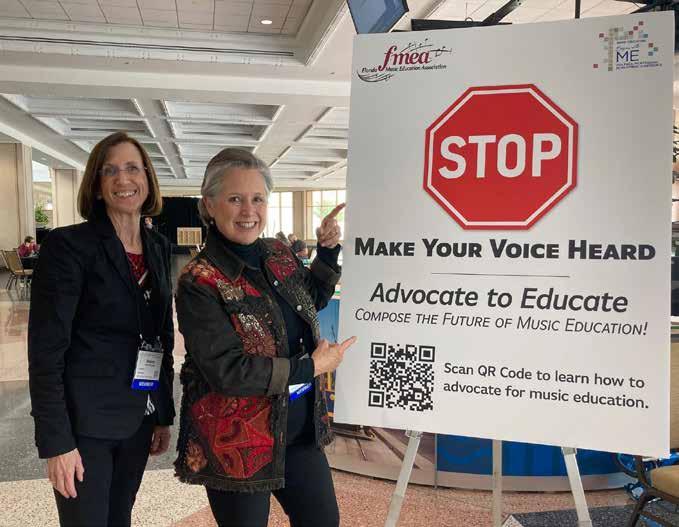
6 Florida Music Director

off knowing the governor had many education priorities, and we knew our bill would get lost in the political “noise.” When we made the decision to go ahead with the legislation again this year, we knew we had to expand support for the bill by seeking some new sponsors.
FMEA Advocacy Action Center
In June of last year, we made the decision to support two letter writing campaigns as part of our 2023-24 advocacy plan. We wanted to share positive news and stories with legislators and other decision makers. We planned the first campaign to coincide with the FMEA conference. The second campaign is scheduled to coincide with Music In Our Schools Month.
The FMEA letter writing campaign soon grew into the FMEA Advocacy Action Center. Thanks to Dr. Sanz and her staff, we were able to set up the center adjacent to the conference registration area, where we had the opportunity to talk with many members and help them craft messages for their postcards and emails. Not only did they ask their legislators for support for the Seal of Fine Arts legislation, but also, they were able to share how much music education means to them.
Gratitude
It takes a village to be successful. I’d like to take this opportunity to thank everyone in the FMEA family village for our advocacy successes.
w We owe a huge debt of gratitude to Beth Cummings, director of fine arts, and Kevin Levine, principal at the Harrison School for the Arts, for helping to secure our very supportive House bill sponsor, Representative Jennifer Canady.
w Thank you to all FMEA members, parents, and community members who took the time to write a postcard or send an email.
w Thank you to every parent and community member who stopped by the FMEA Advocacy Action Center to learn more about advocacy.
w Thank you to all of you who stepped up to work at the FMEA Advocacy Action Center.
• Huge thanks to Megan Alfaro, Abbey Duncan, and Andrea Szarowicz, who helped get the action center up and running on Wednesday afternoon.
• Thanks to all these superstars who worked at the action center: Maria Athanasulis, Katie Aucremann, Andrew Burk, Natalia Cervantes Lopez, Sondra Collins, Joshua Robles Crespo, Scott Evans, Debbie Fahmie, Jess Gronberg, Taylor Koffinas, Lisa Lehmann, Christine Marr, Megan Robichaud, Megan Rodriguez, Kristen Schibner, Rhea Skaggs, Shannon Stern, Leiland Theriot, Colin Urbina, and Natalie Winder. My apologies to other colleagues I may have omitted. You are ALL appreciated.
w Thank you to wonderful colleagues in Broward, Hillsborough, and Orange counties, who called targeted committee legislators when I asked.
w Thank you to Michael Antmann, who brought parents attending the Student Conference Experience to the Advocacy Action Center. His quick thinking and nimble scheduling allowed us to reach so many more parents.
w Thank you to all FMEA members for stepping up when asked. During the past six months many of you stepped up to work not only on this bill but also on many advocacy causes.
Let’s take a breath and take a moment to celebrate. Our consistent message, presence, and relationships are yielding rewards for Florida students and teachers. I will always marvel that the Seal of Fine Arts bill passed all legislative committees as well as the full House and Senate by unanimous votes. Never doubt the value or the magic of the arts to make a difference and to unite people. And never, ever underestimate what this village can accomplish when we work together. Bravo to all!

February/March 2024 7
Jeanne W. Reynolds
Chairperson Advocacy Committee
Jeanne W. Reynolds
FMEA “Immediate Impact” Music Educator Spotlight
In this new feature, FMEA seeks to spotlight the outstanding work and accomplishments of music educators in the earlier stages of their teaching careers. These educators are making an immediate impact on their schools, communities, and students.

MATTHEW SPINDLER
Meet Matthew Spindler, band director at Riversprings Middle School in Wakulla County. Matthew is in his third year as a Florida music educator. During this time, he has increased the enrollment of his program and pushed his students to achieve at a high level. Mr. Spindler has been active in his community and has taken his students to perform for local elementary schools and school board meetings. Mr. Spindler has taken his students to perform at the FAMU Wind Band Festival and even a Jacksonville Jumbo Shrimp baseball game! Mr. Spindler has been a fierce advocate for his program and music education in his community, which resulted in the school district allocating funds for new instruments for his program in 2023-24.

Thank you, MATTHEW, for making an immediate impact on your students, community, and music education in Florida!

TAYLOR GELB
Meet Taylor Gelb, chorus director at Silver Sands Middle School in Volusia County. Ms. Gelb is in her third year as a Florida music educator, during which time her choir program has demonstrated tremendous growth. Her teaching methods are innovative, creating a nurturing atmosphere where students thrive creatively and academically. Ms. Gelb’s commitment to musical excellence is evident in the remarkable growth of her choir and their exceptional performances. Her ability to instill a deep understanding of vocal techniques has contributed to the choir’s success and speaks volumes about her teaching prowess.

Thank you, TAYLOR , for making an immediate impact on your students, community, and music education in Florida!
8 Florida Music Director IMMEDIATE IMPACT

JOSEPH BIGLER
DANIEL RIVERA
Meet Daniel Rivera, music teacher at Hialeah Gardens Elementary in Miami-Dade County. Mr. Rivera is in his fifth year as a Florida music educator, during which time he has shown great passion and achievement as a teacher. Mr. Rivera had the privilege of conducting the FEMEA Rising Stars opportunity for third graders at the University of Florida, conducting the Orff Ensemble for the Superintendent’s Honor Festival in 2024, and guiding the 2024 FEMEA Regional Ensemble. His exceptional work has been further recognized through grants, including the 2023 DCMEA Music Educators Grant and the 2023 Florida Education Initiatives Grant. Mr. Rivera is the author of Empathy, an SEL-based lesson book and unit rooted in the Orff Schulwerk philosophy, released in January 2024.

Meet Joseph Bigler, chorus and orchestra director at Palmetto Ridge High School in Collier County. Mr. Bigler is in his seventh year as a Florida music educator, during which time he has created enriching musical experiences for his students. Under Mr. Bigler’s direction, the Palmetto Ridge Choir and Orchestra were invited last year to perform as part of Walt Disney World’s 50th Anniversary Celebration, and the choir was recently invited to perform the national anthem on national television for the start of the NASCAR Xfinity Series: Contender Boats 300 Race at Homestead-Miami Speedway. Mr. Bigler has served the music education profession in various ways, such as participating in the FSMA Leadership Summit and serving as chairperson of District 18, Florida Orchestra Association.

Thank you, JOSEPH, for making an immediate impact on your students, community, and music education in Florida!
Thank you, DANIEL , for making an immediate impact on your students, community, and music education in Florida!
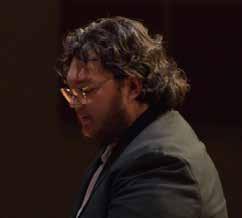
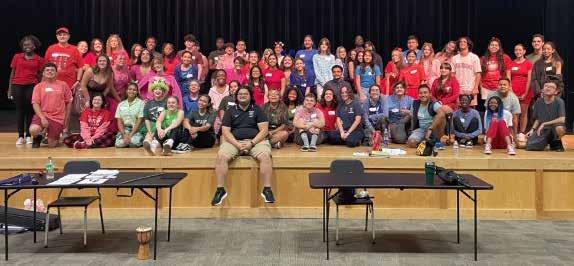
Please submit the FMEA “Immediate Impact” Music Educator Spotlight form and materials for yourself or a colleague who exemplifies the criteria for educators making an immediate impact on their schools, communities, and students.
February/March 2024 9 LET US BRAG ABOUT YOU!
CLICK HERE TO NOMINATE A DESERVING CANDIDATE.
FLORIDA SCHOOL MUSIC ASSOCIATION
Unlocking the Potential Empowering Music Educators Through Leadership QUICK FACTS
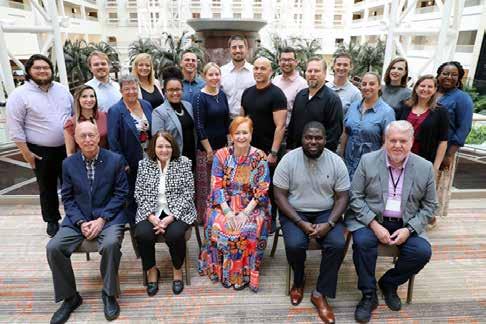
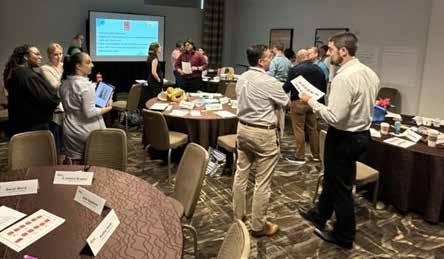
The state and district leadership of our component associations (FBA, FOA, and FVA) aims to provide excellent stewarding of existing music programs and to champion better opportunities for aspiring musicians. This requires leaders to be efficient organizers of persons, resources, and projects, in addition to planning paths to fulfill the vision of a better tomorrow for music education in Florida. This professional development opportunity will provide communication training, team building, scenario-based problem solving, implications of the latest developments in technology, guidance on laws relating to music education, and other skills identified by participants as a need to find success as a leader in Florida.
The training is designed in partnership with the FSMA component organizations: Florida Bandmasters Association, Florida Orchestra Association, and Florida Vocal Association. Approximately 16 to 20 participants will be selected through an application process. FSMA will cover hotel expenses and meals during the training.
July 7-10, 2024
Renaissance Orlando at SeaWorld
Orlando, Florida
Application Deadline: April 1, 2024
Schedule Overview (subject to change)
Sunday:
Orientation will begin at 4 pm, followed by dinner together and possibly an evening activity.
Monday and Tuesday:
Full days of sessions and activities, with social activities in the evenings. Meals provided.
Wednesday:
Final session will conclude by 11 am.
More details will be forthcoming.
Eligibility Note
Because FSMA and its component organizations FBA, FOA, and FVA work exclusively with secondary music teachers (grades 6–12), this program is not open to elementary school teachers. We highly recommend that elementary teachers interested in this leadership training sign up for the FMEA Summer Institute.
N O T E S
SIGN UP 10 Florida Music Director
Snapshotsofthe 2024 CONFERENCE


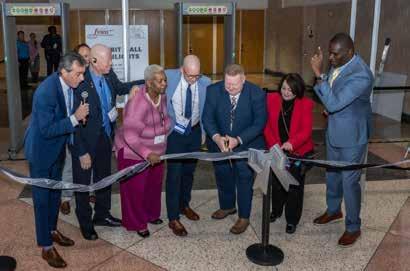

February/March 2024 11
➘

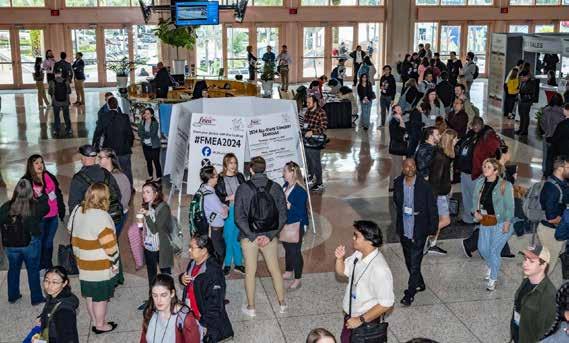
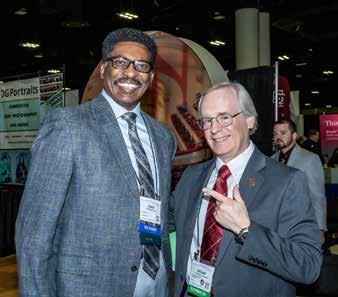

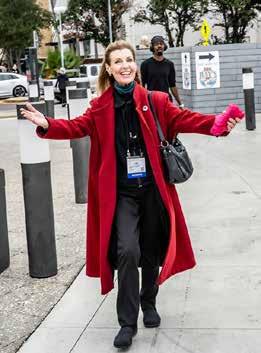
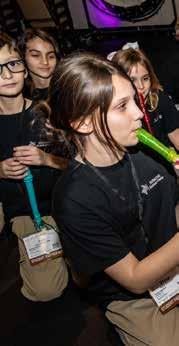

12 Florida Music Director
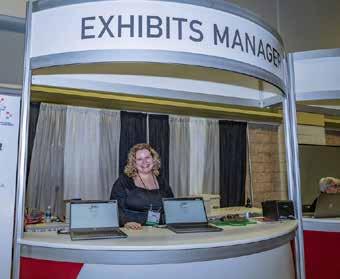
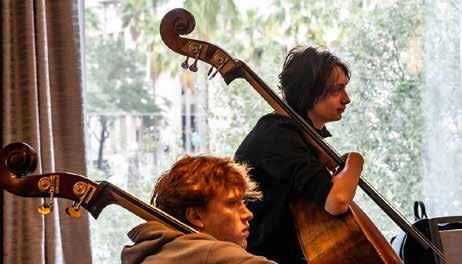
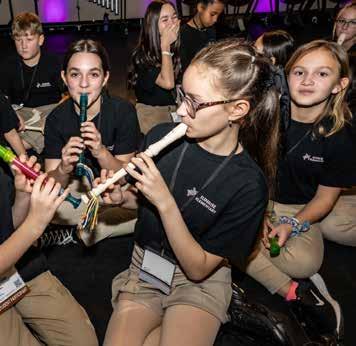
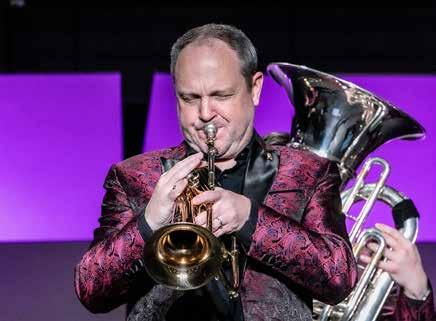
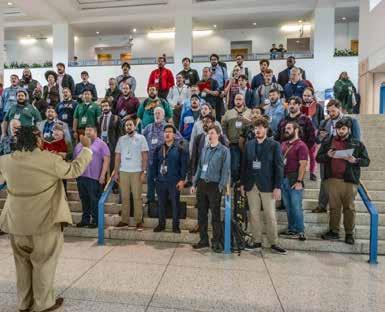
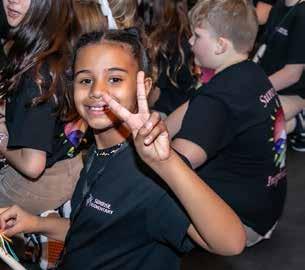
February/March 2024 13 ➘
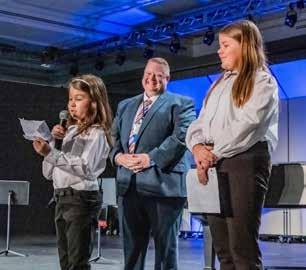





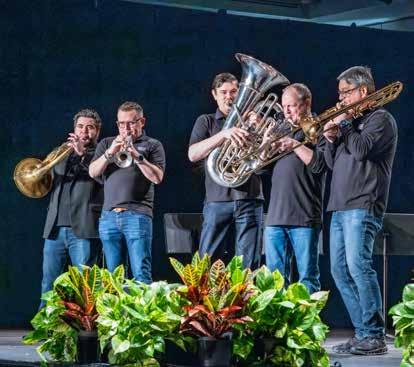


14 Florida Music Director
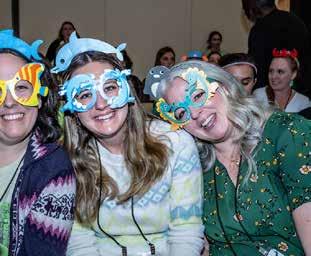


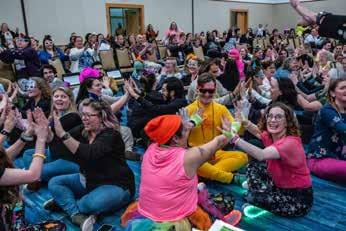
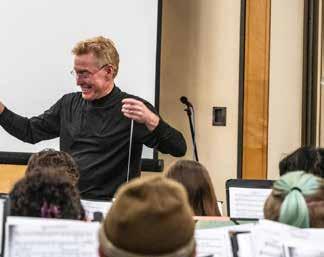
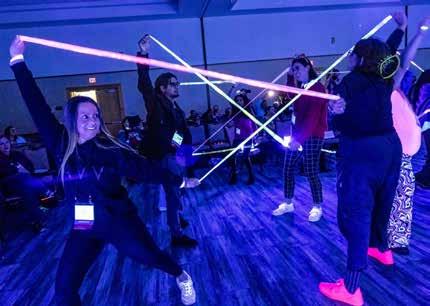
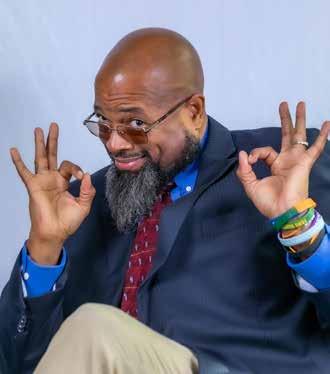
February/March 2024 15

AWARDS COMMITTEE
Congratulations to the 2024 FMEA Award Winners!
ItSondra A. W. Collins Chairperson

is my great honor to introduce our 2024 FMEA award winners. The FMEA Award Program recognizes the efforts and accomplishments of exemplary music educators, school and district administrators, businesses, music programs and projects, and others who have made an outstanding contribution to music education. Their efforts help FMEA attain our mission of promoting a quality, comprehensive music education in all Florida schools. Please applaud these individuals, as well as all the awardees that came before them, as we strive to showcase exemplary music education throughout our state. As you read about our 2024 FMEA award winners, you may have exemplary music educators, administrators, businesses, or programs and projects come to mind. Please remember them when next year’s nomination period begins this spring and nominate them!
Congratulations to all our 2024 FMEA awardees! We honor you and thank you for your commitment to quality and comprehensive music education for ALL, in ALL schools.
ELEMENTARY AND SECONDARY MUSIC EDUCATORS OF THE YEAR
The FMEA Music Educator of the Year designation is awarded to the music educator who has served their students, community, and profession in an exemplary manner. This award recognizes outstanding merit in music teaching. The recipient must have demonstrated notable achievement as a music education professional for 10 or more years, and must have demonstrated continued contributions/commitment to the profession and to FMEA/NAfME.
ELEMENTARY MUSIC EDUCATOR OF THE YEAR
Cynthia Kohanek
Pinecrest Elementary School
Miami-Dade County Public Schools
Nominated by Carlos Abril
Cynthia Kohanek is a proud product of the Miami-Dade County Public School System and its community music organizations. She received the BM in music education from the University of Miami Frost School of Music and the MS in music education from Florida International University.
Ms. Kohanek began her teaching career in 1997 at Pinecrest Elementary School and has served as a music specialist there ever since. As a national board certified teacher, she has taught general music to students in kindergarten through fifth grade. Ms. Kohanek runs an after-school music program that consists of a beginning and advanced orchestra, chorus, and modern band. Her students have participated in both state and local ensembles including All-State Elementary Chorus and MiamiDade County Public Schools (MDCPS) Superintendent’s Honors Music Festival. Ms. Kohanek served as conductor of the MDCPS

Superintendent’s Honors Elementary Chorus in 2007 and 2014 and adjudicates these auditions annually. Ms. Kohanek has served as adjudicator for the Florida Vocal Association District 16 music performance assessment. Ms. Kohanek received her Level 1 Orff Certification and Level 1 Certification from Choral Music Experience (CME) Institute for Chorus Music Education.
Ms. Kohanek was named Teacher of the Year twice for her school and was awarded a Proclamation by the Village of Pinecrest for her musical contribution and service to the community.
16 Florida Music Director

Ms. Kohanek served as assistant director and conductor for the Miami Children’s Chorus for 17 years. In this role she led the beginning and intermediate choruses. She prepared choristers for performances with the Florida Grand Opera. Ms. Kohanek was awarded the Educator of Note Award from the Young Patronesses of the Opera. Ms. Kohanek prepared choristers to sing for the Super Bowl XLIV appearance with Queen Latifah.
Ms. Kohanek is passionate about supporting and mentoring educators. She resurrected the Dade County Music Educators Association and served as vice president, president, and past president. She served as an adjunct professor at Florida International University. She is a MINT (Mentoring and Induction for New Teachers) mentor and a supervising teacher, mentoring more than three dozen interns. She is an active clinician for her district providing annual in-services for professional development.
Students of Ms. Kohanek have gone on to have international professional careers in music. This has been noted through written articles and an aired NBC segment entitled “Pinecrest Elementary School Music Teacher Develops Talented Kids.”
As Lynn M. Maceyras, administrative director of Miami-Dade County Public Schools, states, “Ms. Kohanek is an exemplary music educator who consistently goes above and beyond to make a difference in the lives of her students and fellow educators. Her extensive experience, mentoring endeavors, and dedication to the profession make her an exceptional candidate for the Music Educator of the Year award. Without a doubt, Ms. Cynthia Kohanek has earned my highest recommendation for this esteemed recognition. I wholeheartedly endorse her nomination and believe she embodies the essence of an exceptional music educator.”
Analy Mendez, executive director of the Miami Children’s Chorus, expounds, “Beyond her tremendous musical and teaching skills, and her unique ability to connect and inspire students, she’s an all-around amazing human being—still a role model to so many of us. I cannot think of anyone more deserving than Cynthia Kohanek for this award.”
And as Pinecrest Elementary School’s principal, Suzette Fraginals, adds, “I want to express my sincere gratitude for Ms. Cynthia Kohanek’s remarkable work as our elementary school music teacher. Her contributions have enriched the lives of our students, inspired fellow educators, and left an indelible mark on our school’s musical landscape. Her passion, creativity, and dedication serve as an inspiration to us all.”
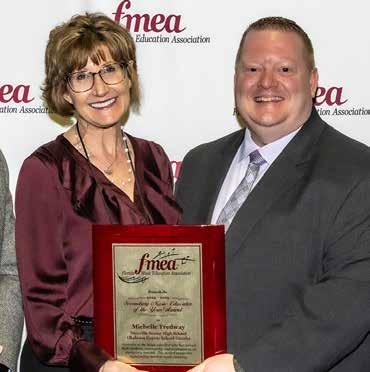
SECONDARY MUSIC EDUCATOR OF THE YEAR
Michelle Tredway
Niceville Senior High School
Okaloosa County School District
Nominated by Deborah Mar, on behalf of FVA
Michelle Tredway is a dedicated and lifelong music educator. Mrs. Tredway earned the BM degree from the University of West Florida and the MM in music education from Florida State University. She continued post-graduate piano performance studies at the University of South Florida in Tampa. Currently in her 34th year of teaching, Mrs. Tredway has taught vocal and instrumental music at every level including elementary, middle school (band and chorus), and high school (AP Music Theory and chorus). Additionally, she spent three years as an adjunct music professor and five years as a full-time assistant music professor at Southeastern University in Lakeland.
Orff Level I certified (FSU) and Kodály trained, Mrs. Tredway is privileged to have worked in Liberty County, Georgia; Polk County, Florida; and most recently in the Florida Panhandle counties of Okaloosa and Walton. Mrs. Tredway worked as middle school choral director at Lewis School (K-8) and Ruckel Middle School for 10 years, feeding into the famed Niceville High School (Michael Dye, director). Post-COVID, she spent two years at Walton High School, where she reinvigorated the choral program, which continues to grow and thrive after her absence. Now in her final two years of public-school education, Mrs. Tredway currently co-teaches as an assistant in the choral program at Niceville High School.
Under her direction, Mrs. Tredway’s middle school choirs consistently earned the highest rating of superior from adjudicators at the District 1 music performance assessments. Furthermore, continued on page 18
February/March 2024 17

while under her direction, her Ruckel Middle School choirs earned the Florida Vocal Association Choir of Distinction status all four years the middle school delineation was in existence (2017, 2018, 2019, 2020). Mrs. Tredway has been named Teacher of the Year by her peers, and she has been named Teacher of the Month by her students.
Also a collaborative pianist, she has worked with many vocal and instrumental ensembles and organizations over the course of her teaching years, including with the Imperial Symphony Orchestra (Lakeland), the Okaloosa Chamber Singers, the Northwest Florida Symphony Chorale, 19 Okaloosa all-county choirs, six Florida all-state choirs, 19 honor choirs (Niceville), and many other solo/small ensemble collaborative performances over the years.
Wanting to further excellence in choral music in Okaloosa County, Mrs. Tredway is presently working with the FWB Community Chorus to begin the first-ever Emerald Coast Children’s Chorus for area students in grades 3-5.
Mrs. Tredway has presented at FSMTA, Arts Councils, and FVA conventions. She has directed honor choirs as guest clinician for the Twin Cities Honor Choir, Junior All-County Choir (Okaloosa County), the Santa Rosa All-County Middle School Honor Choir, and the Polk County All-County Middle School Honor Choir. She has served as all-county middle school choir coordinator for several years. Mrs. Tredway remains an active board-certified adjudicator for FVA and for the Federation of Music in Okaloosa County. She has served the Florida Vocal Association as district chairperson. At present, Mrs. Tredway is privileged to serve the Florida Vocal Association in the elected position of middle school chairperson, a position she will hold for the next two years.
Among all the years and accolades earned, she considers her greatest achievement to be creating a loving, caring classroom atmosphere of musical excellence. It brings great joy to have present and former students reconnect to recount the many happy memories made on trips, at festivals, and in the classroom.
Mrs. Tredway considers it a huge honor to have been voted FVA nominee for the Secondary Music Educator Award by the Florida Vocal Association Executive Board, as well as awarded this distinction by the Florida Music Education Association.
As Elisabeth Olson states, “One of the greatest gifts Michelle Tredway has given to Okaloosa County, and the state of Florida, is through living the example of grace and gratitude as essential foundations for an effective music educator. Michelle has always viewed her position as an educator with incredible gratitude.
This underpinning guides everything from communication, to pedagogical design, to literature choices, to the many responsibilities in the scope of a choral director’s duties. It is this combination of gratitude, grace, love, and competence that leads parents to know their children are, in every way, safe in her classroom; colleagues and administrators know they can depend on her, and students know they can trust her. The FMEA is better for having Michelle Tredway’s skill and influence.”
Elizabeth Phillips, choral director at Escambia High School and FVA clinics chairperson, adds, “Mrs. Tredway has taught around the state of Florida, and her impact as a teacher extends beyond the walls of her classroom. Michelle motivates all students, new directors, and colleagues in a way that makes us strive to be better people.”
And as the executive director of the Florida Vocal Association, FMEA 2020 Secondary Music Educator of the Year, and this year’s FMEA Leadership awardee, Michael Dye, adds, “I taught for 44 years and now serve as the Florida Vocal Association executive director. During that entire time, I have known only a handful of vocal music educators with the talent and dedication that can equal what Michelle brings to her students. I highly recommend that you select Michelle Tredway as the next Secondary Music Educator of the Year. She is the type of educator who epitomizes what I believe is the best of Florida music education.”
COLLEGE MUSIC EDUCATOR OF THE YEAR
The FMEA College Music Educator of the Year designation is awarded to the college music educator who has served their students, community, and profession in an exemplary manner. This award recognizes outstanding merit in college-level music teaching or music administration. The recipient must have demonstrated notable achievement as a music education professional for 10 or more years, and must have demonstrated continued contributions/commitment to the profession and to FMEA/NAfME.
COLLEGE MUSIC EDUCATOR OF THE YEAR
Carlos R. Abril, PhD
Professor of Music Education and Associate Dean of Research
Frost School of Music, University of Miami
Nominated by Alice-Ann Darrow, supported by FCMEA Dr. Carlos R. Abril is professor of music education and associate dean of research at the Frost School of Music, University of Miami. At Frost, he teaches courses in general music methods, cultural diversity in music, philosophy, and qualitative research methods. He also serves as the coordinator of student teaching.
18 Florida Music Director

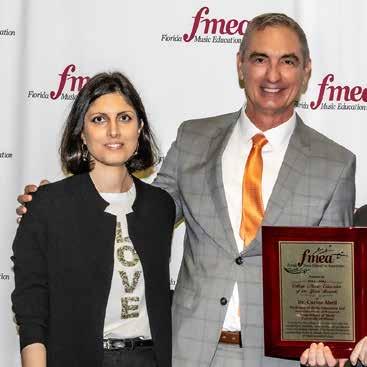
Prior to this appointment, he was associate professor and coordinator of music education at Northwestern University.
Through his research, Dr. Abril seeks to identify barriers to studying music in schools, as well as to illuminate ways to make the study of music more accessible and relevant to children. He has published his work in numerous research and professional journals including Music Educators Journal, Journal of Research in Music Education, International Journal of Music Education, and Journal of General Music. In addition, he has co-edited three books: General Music: Dimensions of Practice; Teaching General Music: Approaches, Issues, and Viewpoints; and Musical Experiences in Our Lives. Recently, he served as a contributor and co-editor of NAfME’s Blueprint for Strengthening the Music Teaching Profession. Carlos has served as chair of NAfME’s Society for Research in Music Education and served as the 2020 program chair for the NAfME National Conference. He currently serves on the NAfME Music Teacher Profession Initiative, a national effort to widen the music teacher pipeline and better support preservice and in-service music teachers in the early years of their development. He has also served on the Research Panel for the National Endowment for the Arts and the advisory committee of Save the Music.
As an educator, Dr. Abril is committed to inspiring, empowering, and supporting his students. He inspires them to find or draw upon their musical and intellectual curiosities about the discipline, pulling from life, musical, and professional experiences. He empowers them by challenging them to stretch their thinking, deconstruct their assumptions, and open themselves to new knowledge. Part of empowerment is affording them space to problem solve, reflect, and commit ideas to paper independently. He supports them, in part, through collaborations. Just this year he published a book chapter on marginalized com-
munities in music with one student and worked with two others on curating an international webinar series on cultural diversity in music education.
His former students are educators and researchers in both K-12 schools and universities. Former graduate students teach at institutions such as University of Southern California, University of Wisconsin, Florida International University, DePaul University, Oakland University, University of Maryland, University of New Hampshire, and Universidad de la Americas. Many of these students have gone on to serve as journal editors and members of editorial boards. Former undergraduates serve as successful K-12 music educators, community program leaders, and arts/school administrators. Some have been recognized as Teachers of the Year while others have won teaching grants or been selected as FMEA Emerging Leaders.
Recognized for his exceptional teaching and scholarship, Dr. Abril has been honored with numerous awards during his time as both a university and public-school educator, including the Phillip Frost Award for Excellence in Teaching and Scholarship, the University of Miami Provost’s Research Award, the Cervantes Outstanding Music Educator Award for work in Hispanic communities, and the Miami-Dade County Public School Region V Teacher of the Year. At Northwestern University, he was named a Fellow of the Searle Center for Teaching Excellence and to the Student Government’s Faculty Honor Roll.
Throughout his career, Dr. Abril’s passion for music education and dedication to empowering the next generation of music educators have been evident in his work, research, and mentoring. He continues to inspire positive change in the field and equip his students to drive transformative progress in music education.
And, as Scott R. Sheehan, president of the National Association for Music Education, states, “Personally, I feel aspirational best describes Carlos’s personality. He inspires all who know him to be better educators, leaders, scholars, musicians, and advocates. He does this through his incredibly thoughtful, respectful, and collaborative demeanor and by genuinely valuing the diverse opinions of others. I have always been personally moved by Carlos’s willingness to have critical conversations and his openness to discuss challenging issues in an authentic and sincere way. Carlos’s professionalism, expertise, and leadership are of the highest caliber, and his service to the profession and NAfME is appreciated beyond words.”
And president-elect of NAfME as well as professor of music education at Temple University, Dr. Deborah A. Confredo, adds, “It should be obvious that I could go on extolling the tremendous continued on page 20
February/March 2024 19

attributes of Dr. Carlos Abril as a leader in music education. He is a strong and unapologetic advocate. He is tireless in his approach to leading our profession forward. His commitment to our collective cause is indefatigable, and I foresee his work and influence being a compass for good in all that we do for a long time to come.”
ELEMENTARY AND SECONDARY ADMINISTRATORS OF THE YEAR
The FMEA Administrator of the Year designation is awarded to a school administrator who is not a professional music educator, but who displays ardent support of school music programs. This award recognizes excellence in leadership, encouragement, and promotion of music education in Florida schools. The recipient must have demonstrated significant efforts in support of music education resulting in awareness or enhancement of the school’s music program, allocation of resources, and/or growth of music programs, as well as serving as an active administrator for a minimum of five or more years and employed in their current position for three years.
Elementary Administrator of the Year
Lauren Limoncelli Watson
Principal, Lake George Elementary School
Orange County Public Schools
Nominated by Katie Grace Miller
Lauren Limoncelli Watson has spent her entire career in Orange County Public Schools, supporting students and their arts education. Ms. Watson was a teacher at three different elementary
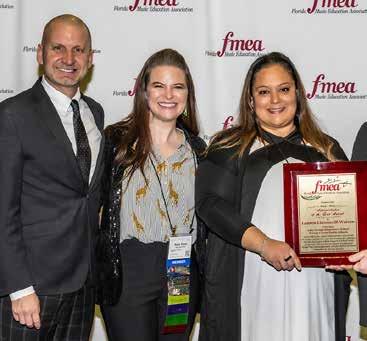
schools and then spent time as an assistant principal for five years before becoming the proud principal of Lake George Elementary School, where she has also been for five years.
She received her undergraduate degree from Rollins College and her master’s degree from Nova Southeastern University. Her love of music started when she was just three years old learning piano. As she grew older, the experience in concert piano, chorus, and theater increased her passion for the arts. As a teacher, it was always a passion to ensure cross-curricular activities were evident when you walked through Lauren’s elementary classroom. As a principal, making sure the opportunity is available to all students to be able to express themselves in any form of art they desire, from vocal, instrumental, visual, etc., is crucial to her success.
During her first year as a principal, Ms. Watson led her school through the pandemic while ensuring that a full musical production, outdoor concerts, and art shows were still possible, following CDC regulations. For Ms. Watson, music education is part of the core curriculum and should be fully supported and encouraged.
Lauren’s goal as an administrator is to always support. She sees her role as a leader as not a shining spotlight role, but as support to lift others up for success! She knows that if her students and teachers are succeeding, then she is doing the best at her job as an administrator. This support includes the support of her students’ arts education. Students are NEVER pulled from arts classes since they only get music and art one time a week. The entire leadership team is instructed to make sure that students do not lose this incredibly important part of their education, and we have only seen positive outcomes from this.
What is most obvious as an administrator is not only her support of her entire staff, but her support of the arts. When she arrived at Lake George, the arts programs had room to grow and blossom, and she provided the means and support for that to happen. Under her leadership, Lake George Elementary began an amazing musical program for second through fifth graders, a full school art show, and an extra alto recorder group for advanced players, and Lake George has had the most students attend all-state ensembles in the school’s history. She ensures that her school’s students are participating in OCPS all-county groups every single year, without fail. Ms. Watson ensures that the music and art teacher do not have morning or afternoon duties so they can have rehearsals/practices/clubs on any morning or afternoon of the week. She supports any fundraising opportunities the arts can find, and she is always on the lookout for ones she can get started so their programs have a robust
20 Florida Music Director

budget to pull from to enhance their students’ arts education.
Lauren Watson gives advice in her own words for any new principal: “If you have a music teacher who has passion and is willing to do the work to provide students with the opportunity to express themselves through the arts, support them as much as you can! Lake George is blessed with one of the best music educators, which makes my job as her principal amazing!”
As superintendent of Orange County Public Schools, Dr. Maria Vazquez, states, “Ms. Watson’s commitment and unwavering support of the performing arts have provided Lake George Elementary students with access to remarkable opportunities, including participating at Florida Elementary Music Educators Association regional and all-state competitions. Ms. Watson has demonstrated a commitment to build a thriving music program at Lake George Elementary. Last year, she ensured the Advanced Lake George Jammers could perform at the FMEA conference in Tampa by paying for their charter bus. Ms. Watson also supports her students by cheering them on at their performances, ensuring music teacher Katie Miller has time in her schedule to conduct rehearsals before and after school, and providing dollars for other staffers who assist in performing-arts programming at her school. Not only does Ms. Watson value the arts, she helps ensure that every student can be successful. She supports her teachers and staff and helps make Lake George a family. Ms. Watson’s contributions truly affirm that she is worthy of the Administrator of the Year award.”
And as Matthew Neveras, Lake George Elementary third grade teacher and assistant director of Lake George Musicals, adds, “While many principals are solely focused on test scores and data, Ms. Watson treats our music program like it is just as important. For a lot of our students, that spark will lead them to a passion or even a career in music that begins at the elementary level. And that spark couldn’t have been lit without the support of our amazing principal, Lauren Watson.”
Secondary Administrator of the Year
James Harris
Principal, Alonso High School Hillsborough County Public Schools
Nominated by Amanda Griffis
James Harris has been leading schools in Hillsborough County Public Schools for the past 18 years. Mr. Harris is the principal of Alonso High School in Tampa, Florida, where he brought Alonso High School to an “A” rating in 2022, for the first time since 2013. Mr. Harris also facilitated Alonso High’s transition to becoming an official International Baccalaureate School in 2021.

The band program at Alonso High School serves more than 200 members and is the largest band program in Hillsborough County. Under Mr. Harris’s leadership, the Alonso administration, IB program, and guidance department have created a school culture that prioritizes student commitment in music and arts education. Mr. Harris maintains the importance of music programs, ensuring that remedial, CTE, and ELL students are still able to take band, chorus, orchestra, and/or theater. Alonso High School is in the large minority of IB schools in the state whose students can attend their music elective every day, rather than every other day, throughout their entire time in high school. Under Mr. Harris’s leadership, Alonso High prioritizes music electives during the master scheduling process and works with students and parents to encourage commitment and dedication. Mr. Harris supported the expansion of the jazz program from one class period to two, as well as prioritized expansion of the orchestra classes in an effort to better serve student proficiency levels.
Mr. Harris is also a supporter of invaluable music and professional development opportunities, even during arduous state testing windows, such as the Midwest Clinic in Chicago (takes place during schoolwide end-of-course testing), the Alonso Jazz Ensemble performance in New Orleans in April 2021, the Alonso Theater performance in Edinburgh Festival, Scotland in August 2023, and the Alonso Band performance at the Smokey Mountain Music Festival in April 2024, to name a few. He is a regular emcee at music concerts and is an attendee at evaluations and competitions for band, chorus, orchestra, and theater.
Prior to Mr. Harris’s tenure at Alonso, he served as an administrator at Sickles High School, another local school that is well continued on page 22
February/March 2024 21

known across the state for their flourishing music programs. It is no coincidence that both schools where Mr. Harris has served as administrator boast high student enrollment, high community engagement through music, and a school culture that recognizes and prioritizes the invaluable experience that music brings to students’ lives.
Mr. Harris earned the MAEd in educational leadership from Argosy University in Tampa and the BS in social science education from the University of South Florida. He was named Assistant Principal of the Year by the AP1 Council for the 200910 school year.
As the retired supervisor of music of Hillsborough County Public Schools, Ted Hope, states, “James believes deeply that the music program is the heart of the school. He gives the art teachers autonomy to make decisions in the best interests of the program. He prioritized the school’s master schedule and took great care to ensure that electives would not conflict with other academic classes, including IB. As principal, when there are conflicts, he would hand schedule each student to ensure all students were able to take their performing art classes, which has encouraged the programs he oversees to flourish. As you can see, James Harris is a huge supporter of the music program in his school. His determination to maintain and expand the performing arts coupled with his desire for their success makes him a candidate worth considering.”
And as Kenneth Hart, the deputy director of the Chief of Schools Office in Hillsborough County Public Schools, adds, “I am certain there are many very qualified candidates being nominated for this prestigious award. In my humble opinion, however, FMEA will find none more dedicated, none more humble, and none more qualified to represent the high standards of excellence FMEA expects of its recipients than James Harris. I recommend him with no reservations and am certain he will represent the organization extremely well.”
SCHOOL BOARD MEMBER OF THE YEAR
The FMEA School Board Member of the Year designation is awarded to a Florida district school board or an individual school board member who has demonstrated support for and commitment to high-quality music education throughout the school district. This award recognizes excellence in leadership, encouragement, and promotion of music education in Florida schools. The recipient must have demonstrated a significant contribution in support of music programs/curricula in the district’s schools, and must have demonstrated evidence of districtwide policies and long-range plans for music education at all levels, as well
as demonstrated evidence of equitable access to music programs across all grade levels including financial support of music instruction in the district.
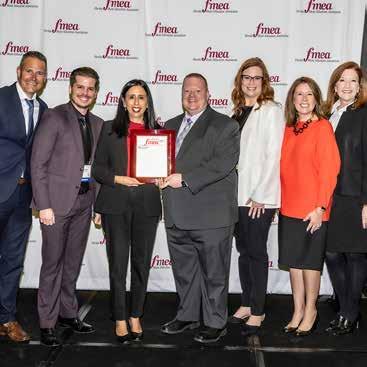
School Board Member of the Year
Nadia T. Combs
School Board Chair
Hillsborough County School Board
Nominated by Tracy Lisi
Chair Nadia T. Combs has always had a passion for providing children with the education they deserve. Chair Combs is a proud graduate of the University of South Florida where she earned a bachelor’s degree in social studies education and a master’s degree in educational leadership. She began her teaching career working at the Japanese Ministry of Education. She then excelled in Hillsborough County Public Schools, winning Teacher of the Year at Franklin Middle School as well as Middle School Social Studies Teacher of the Year for the entire county.
Chair Combs was elected to the Hillsborough County School Board, representing District 1, in 2020. She is one of seven members responsible for making policy decisions and overseeing a total budget of $3.3 billion for the seventh largest school district in the nation, which is also the county’s largest employer. Chair Combs knows the complex school district well because she wore many hats prior to becoming a school board member. She was a teacher, team leader, department head, and district teacher
22 Florida Music Director

trainer, and even taught at-risk students through the Drop Out Prevention Program.
Nadia Combs is also an entrepreneur who founded a company to provide tutoring services to thousands of students in Title I schools in Hillsborough County and throughout Florida. She currently owns and operates Brighton Learning Consulting, which she founded in 2014, continuing to provide educational support to students in public, private, magnet, and charter schools throughout Hillsborough County.
Nadia Combs has served as a member of the Children’s Cancer Center Panera’s Knead for Knowledge Scholarship Committee from 2012 to the present. She is currently serving on the board of the Glazer Children’s Museum and is co-chair for its Education Board. Recently she also became a member of the USF College of Education Dean’s Advisory Board. She has actively served as a judge for Hillsborough County School events including the History Fair and the World of Wisdom Tournament. She also served as a member of the Children’s Cancer Center Knead for Knowledge Scholarship Committee from 2012 through 2020.
An advocate for arts in the schools, Chair Combs played violin in elementary and middle school, and although she admits to not being the best karaoke singer, she knows that music education is often the key to reaching and motivating students. Chair Combs continually supports and approves the Music in Our Schools Month proclamation every March. She initiated, by specific request, “Performances on the Plaza” prior to each school board meeting throughout the year that feature musical ensembles, theatre troupes, and dancers from Hillsborough County Public Schools’ elementary and secondary schools. She attends these performances and then invites student performers from these performances to introduce themselves at the beginning of the school board meeting. She also supports and approved the purchase of Quaver Music as elementary music education curriculum, as well as educational partnerships between Hillsborough County Public Schools and the Straz Center for the Performing Arts, Recycled Tunes of the Gasparilla Music Foundation, the Florida Orchestra, the University of South Florida School of Music, and Music Will. She also continually supports and actively seeks a millage referendum to support music education in Hillsborough County Public Schools.
As Caroll Vick, program manager of Arts in Education for Hillsborough County Public Schools, states, “[Nadia] Combs shows her support of arts education by showing up for our students! Her support of a quality, comprehensive arts education is apparent through her actions. Hillsborough County Public
Schools is one of the 2023-24 NAMM Best Communities for Music Education. This is in part due to the staunch support of music education by Chairperson Combs. Nadia Combs truly demonstrates the leadership that is necessary to maintain, sustain, and increase access to high-quality arts experiences for all students.”
And the supervisor of middle/secondary music education in Hillsborough County Public Schools, Jon W. Sever, adds, “In this day and age, the business of education is tough. However, when you have unconditional and unwavering support of music education, like we have from [Chair] Combs, we are assured that our district has the correct focus for all subjects and the students of Hillsborough County Public Schools will continue to thrive, as our music programs have!”
LEADERSHIP AWARD FOR MUSIC EDUCATION
The FMEA Leadership Award is presented to an individual who demonstrates outstanding and sustained skill in a leadership or an administrative capacity and who carries the mission of the FMEA forward throughout the state and/or the nation. The recipient must have served a minimum of five years in a leadership or administrative capacity and employed in their current position for three years, as well as must have demonstrated notable achievements as a leader in the promotion of music education and continued contributions/commitment to the profession and to FMEA/NAfME.
Leadership Award
Michael Dye
Executive Director
Florida Vocal Association
Nominated by Jeannine Stemmer on behalf of FVA
A native of Arkansas, Michael Dye was born and raised in Pine Bluff where he attended the Dollarway public schools before earning the BME from Henderson State University (Arkadelphia) and the MME from Arkansas State University (Jonesboro) where he worked as a graduate teaching assistant. He also did extensive graduate work in educational leadership through the University of Arkansas (Fayetteville).
Mike began his music education career at Southwest Junior High in the Hot Springs School District, Hot Springs National Park, Arkansas, before returning to his alma mater where he conducted the choirs at Dollarway High School for 12 years. While in Pine Bluff, Mike was elected Arkansas Choral Directors Association’s Southeast Arkansas region chair and later the continued on page 24
February/March 2024 23


Arkansas Choral Directors Association’s state president. He was also elected state president of the Arkansas chapter of the American Choral Directors Association. During his Arkansas career, Mike also served a term as the ArkCDA’s state festival chair. During his last year in the state, Mike was chosen the ArkCDA’s Senior High School Director of the Year.
In 1990 Mike accepted the position of choral director at Niceville High School in Okaloosa County, Florida. During his 30-year Florida career at Niceville, which ended with his retirement in 2020, Mike was twice elected Florida Vocal Association’s District 1 chair, FVA president, and appointed to serve as music, clinics, all-state, MPA, and past-presidents chair. He was also appointed FVA’s representative to the Florida School Music Association where he served continuously for a decade, including collaborating with other component representatives to establish standards for performance assessments and adjudication training. Later, Mike was elected president of FSMA, while also serving five years on that association’s executive committee. One of the most rewarding opportunities of leadership and service was serving FVA as an all-state choir coordinator for every FVA all-state senior high choir over a period of more than a decade.
In 2020 Mike was hired as the Florida Vocal Association’s executive director, a position in which he still serves. He is again serving on the FSMA board and its executive committee.
More important than any other leadership position in which Mike has served, he led the students of his choral music pro -
grams for well over 40 years. Many of his students and interns are now music educators themselves. Hundreds of his singers were selected to all-county and all-state choirs. The choirs he conducted consistently earned the highest ratings at district and state music performance assessments, including 18 FVA state MPA choirs of distinction. During his time as Niceville’s choral director, students performed three times in Carnegie Hall and toured internationally eight times over a 20-year period. The Niceville Singers performed in the Brucknerhaus Concert Hall in Linz, Austria; Coventry Cathedral in England for the World Church Music Festival; Beijing, China, for the Chinese Choral Directors Association and with the Little Swans Childrens Choir in Xian; San Marcos Basilica, Venice; Chiesa San Giovanni Battista, Monterosso, Cinque Terra, Italy; St. Patrick’s Cathedral, Dublin; the unique concert venue Duetsches Jagd und Fishereimuseum in Munich, Germany; El Vendrell Cathedral (Pablo Casal’s home church) in El Vendrell, Spain; Schönbrunn Palace, Vienna; and dozens of other venues in 10 different countries.
Mike lives in Valparaiso with his wife, Wanda. They have two sons, Dr. Matthew Norton (Naomi), Pensacola, and Reverend Timothy Norton (Kendra), Fort Pierce, and six grandchildren, Lauren, Graham, Wesley, Caleb, and twins Lydia and Emmy.
As Deborah Wong Mar, retired music educator and 2023 FMEA Secondary Music Educator of the Year, proclaims, “Michael Dye exemplifies the mindset of a servant leader in all that he does.”
FVA Immediate Past President Jeannine Stemmer, states, “Mike is a pillar of wisdom and experience for the organization. He serves with all his mind, soul, and body. I pray that his legacy will stay alive in FVA for many more years so that the next generation will learn what it is to work hard for what you love. He shows that there is much more to success than dialogue. I hope to be half the leader that Michael Dye is.”
And J. Mark Scott, executive director emeritus of the Florida Vocal Association and 2020 FMEA Leadership Award recipient adds, “I can think of no one better than Michael Dye to receive this award. His leadership in FVA, FMEA, and FSMA has been essential in keeping Florida at the forefront of music education. He is truly an outstanding leader.”
DISTINGUISHED SERVICE AWARD OF AN ORGANIZATION AND OF AN INDIVIDUAL IN MUSIC EDUCATION
The FMEA Distinguished Service Award is presented to persons or organizations inside or outside the field of professional music education. This award recognizes exceptional service to or support of music education. The recipient(s) must have demonstrated noteworthy contributions to music education, with statewide impact preferred.
24 Florida Music Director

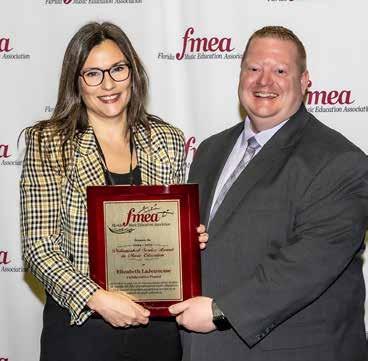
Distinguished Service Award of an Individual in Music Education
Elizabeth Landrum LaJeunesse
Collaborative Pianist
Nominated by Tabitha Peck on behalf of FVA Elizabeth Landrum LaJeunesse is a collaborative pianist who is highly sought after in the Tallahassee area (and throughout the state of Florida). Elizabeth, a Tallahassee native and lifelong resident, holds degrees in choral music education (BMusEd, 1996) and organ performance (MM, 2008) from Florida State University. Elizabeth developed a love for collaborative piano at a very young age, and was nurtured in this love by her high school chorus teacher, Judy Arthur. She was fortunate to study piano with Carolyn Bridger during high school and throughout her time at FSU, as well as to serve as accompanist for University Singers for three years under the direction of André Thomas.
As a Leon High School alumna, Elizabeth is proud to serve as staff accompanist for Leon’s choral and band programs alongside directors Tabitha Peck, Maggie Smith, and Lee Commander; in 2020, she had the privilege of accompanying Leon’s Capital Singers at their Southern Division ACDA performance. In addition to her work with Leon, Elizabeth frequently collaborates with other band programs in the Panhandle to coach and accompany students. She has collaborated with TSO Chorus, Tallahassee Civic Chorale, FSU Chamber Choir, University Singers, Collegians and Levana, Vocal Jazz ensemble, and FSU summer music camps, and frequently joins the Tallahassee Community Chorus and FSU choirs as a continuo harpsichordist.
Elizabeth maintains an active schedule as a freelance collaborative pianist and organist, coaching many undergraduate and
graduate singers and instrumentalists. Over the past five years she has begun specializing in saxophone repertoire and enjoys her frequent collaborations with the studio at FSU.
After serving several Tallahassee churches as organist over the past three decades, she was appointed organist last year at First Presbyterian Church in Tallahassee, a position most recently held by her organ teacher, Michael Corzine. She has appeared as a guest service organist and recitalist at several churches throughout the Southeast.
As a sophomore at Leon High School in 1990, Elizabeth auditioned for and was selected by the clinician to accompany her first Florida all-state chorus, the newly formed 9th/10th grade SATB ensemble. She was again selected as a student accompanist for the next two years, and upon entering college, she was hired by FVA. She has been accompanying Florida all-state choirs for over three decades (since she herself was in high school!) and has accompanied an all-state chorus every year since except for 2002, serving almost every ensemble and working with such notable clinicians as Paul Salamunovich, Judy Bowers, René Clausen, Jeffery Ames, and Sandra Snow, among many others.
Elizabeth has three adult children, Cassie, Alex, and Ellie, all of whom were members of Leon Performing Arts and participated in all-state reading and concert choirs, as well as all-state band; they continue to enjoy singing and playing in their free time.
Elizabeth frequently gives of her time and talents to make sure music educators in the greater Tallahassee area and the state of Florida are successful in their classrooms and performances, and cares deeply about music education in the state of Florida.
Lee Commander, director of bands at Leon High School, states, “It is easy to see the tremendous efforts that Elizabeth LaJeunesse has put forth to cultivating outstanding musicianship and fostering music education in the state of Florida. As a state, we are lucky to have a person whose quest to provide for young people continues well beyond their time in secondary schools.”
And Dr. Kevin Fenton, professor of conducting and ensembles and director of the University Singers at Florida State University, adds, “Often, when one thinks of service, the volunteer spirit and dedication comes to mind. When I think of Elizabeth and her nomination for the Distinguished Service Award, I think of dedication and generosity, but I am most struck by the absolute artistry she shares each time she performs. I am inspired by Elizabeth’s commitment to bring her best to each musical experience. I believe that Elizabeth continued on page 26
February/March 2024 25

enhances music education and the choral art each time she performs with a choir or collaborates with an instrumentalist or singer. She represents the best of the profession, and she is a beacon of what is possible. She would be perfect choice for the FMEA Distinguished Service Award.”
Distinguished Service Award of an Organization in Music Education
Cadence Music, Inc.
Business Manager Todd Handley
Nominated by Harry “Skip” Pardee
A native of Southwest Florida and a proud graduate from the School District of Lee County Public Schools (Lehigh Senior High School), Todd Handley has had an appreciation for education and those who teach firmly imprinted in his philosophy from literal birth. Both of his parents were educators, and both retired from teaching after 30-plus years in the profession.
Sports consumed most of his time in his early years. He was an incredible baseball and football player (at least that’s how he remembers it!). Even as an elite athlete, music always seemed to find its way into what he was doing. He could be heard in the outfield of his baseball games whistling as loud as he could whatever song popped into his head at the time. His mom would get reports from his classroom teachers that other students couldn’t focus on their studies due to Todd’s loud singing from the bathroom. He had a song in his heart and wanted everyone to hear it!
It was in sixth grade when Mr. Skip Perry at Lee Middle School introduced Todd to the trumpet. He was decent on the trumpet, despite not practicing, and was good enough to make all-county band and sit at the top of his school band program. His musical trajectory was changed in 1998 while auditioning for the Spirit of Atlanta Drum and Bugle Corps. Because of his lack of practice, he did not make the soprano/trumpet line. The director, Dennis Lorenza, must have seen something in him and offered him a position on the contra/tuba line. Wanting to be a part of the organization, he gratefully accepted. It was in that summer and with that organization that he started thinking of music as a possible profession and had found his voice, the tuba.
When he came back from marching DCI that summer, he had a changed approach and work ethic regarding music. He got more involved in his school music program and was seeing real growth on the tuba. His time at Lehigh Senior High School with Jay Parales and Chris Bonner was no exception. Mr. P and Mr. Bonner encouraged him to participate in everything: S&E, all-state auditions, jazz band, indoor drumline, concert band,
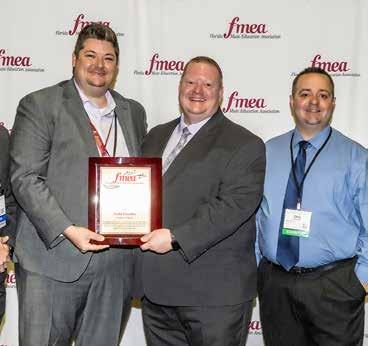
marching band, youth orchestra, and anything else they could think of.
It was three days after his high school graduation that his musical trajectory was altered again. A fellow bandmate from Lehigh told him that he should apply to work at Cadence Music in Fort Myers, Florida. Having worked a few other jobs growing up including golf course attendant, Taco Bell food service, and construction work, he was thankful to begin working in a field that he was really interested in—music. He was hired by Tom Kracmer to work in the repair shop, primarily cleaning instruments. At that time Cadence Music was a pretty small shop, having only a small wash tub for cleaning most instruments. Being a tuba player, Todd was responsible for … you guessed it … cleaning tubas (the only instrument that wouldn’t fit in the wash tub). Subsequently, much of his time was spent scrubbing tubas on a piece of cardboard using a garden hose on the sidewalk behind the shop.
In 2003, Todd transferred from Edison Community College to Florida State University to pursue a degree in music education. While at FSU he continued to grow musically and continued to cultivate his love for education. He started a small business fixing instruments in a friend’s garage. He was used to cleaning on a sidewalk, so a bathtub was a welcomed improvement. The business continued to grow, and when he left FSU in August 2005, he was working on the faculty’s instruments and had a profitable small business. He was sitting in Dr. Steve Kelly’s “Teaching Music in American Society” when he decided that he could still be involved in music education, but instead of in the classroom he could be a support system and advocate for those in the trenches, also known as school music classrooms.
It was in August 2005 that Todd decided to go back home and work with Tom Kracmer at Cadence Music, where he still works today. Having developed into a decent tuba player and instru-
26 Florida Music Director

ment repair technician, staying busy was not very difficult. He started finding professional playing opportunities and started building a pretty good private lesson studio. As he started building his career, supporting and encouraging ALL people through music education was ALWAYS his priority. Supporting sometimes meant talking a director off a cliff after a disappointing MPA performance. It sometimes meant fixing a student’s saxophone that they dropped an hour before their performance. It sometimes meant encouraging a new music educator to never stop playing and to join their local community concert/jazz band, of which he plays with two (Bonita Springs Concert Band and Naples Concert Band). It sometimes meant helping a music director increase the size of their program with an instrument petting zoo. It sometimes meant moving a tuba from one school to another. It sometimes meant letting a local school borrow five tubas and four euphoniums so their musicians could have a combined concert. It sometimes meant helping to start a local New Horizons ensemble.
Music and education have been entrenched into Todd’s life. He is where he is and does what he does because of the teachers that have molded him into the person he is. Just as his teachers did for him, he will continue to express kindness and understanding, and will be generous with encouragement through music education. There is one thing that continues to motivate Todd: MUSIC IS FOR ALL!
Todd Handley serves as the business manager for Cadence Music, Inc., out of Fort Myers, Florida. He is an active freelance musician, educator, and business leader in music education in Southwest Florida. Todd’s mission to support music education for all children in our community is realized through the many students and teachers who benefit from his professionalism, timely work, and servant leadership in schools.
As Skip Pardee, district coordinator of fine arts in Collier County Public Schools and FMEA board member at large, expounds, “Just recently, Florida Music Education Association and the Hurricane Relief Committee’s executive leadership received a hearty donation of instruments and equipment to address learning gaps caused by Hurricane Ian. Without hesitation, Cadence Music agreed to take possession of the equipment, work with music supervisors in the three impacted communities to assign instruments and equipment to receiving schools, and facilitated delivery. This type of servant leadership is part of what we hold dear as members of FMEA, and is indicative of a career of service to the profession.”
And Scott Evans, Orange County Public Schools’ senior director of visual and performing arts and FMEA president-elect, adds, “His selfless actions and tireless advocacy for music educa-
tion have made an immeasurable impact on our community. The lasting legacy he has created through his efforts will continue to resonate with students and teachers for years to come.”
EXEMPLARY MODEL MUSIC PROGRAM
The FMEA Exemplary Model Music Program/Project designation is awarded to an individual or group for a meritorious, exemplary music education programs or exemplary projects completed in the field of music education. Exemplary Music Programs or Projects may include exemplary or innovative music education that provides or continues to provide a significant, positive impact on students, music educators, and/ or schools. These types of programs might include, but are not limited to, those that resulted or are resulting in: elevated music/arts education advocacy or awareness, beneficial workshop opportunities for students or educators, effective music education and the innovative implementation of programs that provides high student engagement and opportunities for students, improved music educator effectiveness, relevant research, effective community programs/projects impacting schools, school improvement as related to music education, effective multicultural or interdisciplinary programs/projects, or comprehensive music education programs that may include non-traditional music offerings.
Exemplary Model Music Program
Miami Jam Sessions and the Donna E. Shalala MusicReach Program
Frost School of Music, University of Miami Director Nerissa Rebagay
Miami Jam Sessions, in partnership with the Donna E. Shalala MusicReach program at the Frost School of Music, provides free music therapy socialization and mentorship programming to neurodiverse adolescents and young adults, facilitated by board-certified music therapists. Participants work alongside volunteer mentors to sing, play instruments, and build relationships in success-oriented music-making experiences with peers. Miami Jam Sessions embraces the diversity of their group members and designs sessions to provide the opportunity for both participants and volunteers to socialize and build inclusive relationships regardless of neurotype.
Miami Jam Sessions envisions a world where individuals of all abilities and backgrounds have access to build confidence and relationships through music-making with others. The Jam Sessions program seeks to provide opportunities for participants to learn, practice, and reinforce social skills; equip volunteer mentors with the confidence to interact with and mentor neurodiverse individuals; and create lasting friendships and memories through shared music-making. A program of the San continued on page 28
February/March 2024 27

Diego-based nonprofit Banding Together, Miami Jam Sessions is a partner with the Donna E. Shalala MusicReach Program at the Frost School of Music and takes place on the University of Miami campus. Miami Jam Sessions is proudly funded by grant partners, which in the past have included The Kirk Foundation and Music Access Miami at The Miami Foundation. Additionally, the support of their participants, volunteers, and community through donations and fundraisers allows them to provide all sessions at no cost to their participants.
Miami Jam Sessions maintains a high quality of programming because of the training and continuing education of the organizing and leading board-certified music therapists. Specialized training allows sessions to be personalized to the unique needs and strengths of group members, fostering a positive environment for socialization and music-making. The volunteer mentorship aspect is unique to Miami Jam Sessions, and many mentors have mentioned through reflective journaling and surveys that volunteering has proven to be a valuable experience in pursuit of careers in music education and music therapy. In the Miami Jam Sessions program, everyone participates in inclusive music-making environments, where all are welcomed, appreciated, and supported without personal or musical judgment. Miami Jam Sessions also provides access to training and resources for volunteer mentors and community musicians to be successful in interacting with individuals with varying needs. Likewise, neurodivergent individuals need access to settings where they can make music. Success-oriented music-making settings open the door to opportunity through a lens of acceptance and celebration.
Throughout its six years in providing services, Miami Jam Sessions has tracked and reported data using standardized assessments to measure the impact of the music therapy socialization group and mentoring program on program participants. Additionally, volunteer mentors complete qualitative and quantitative assessments of the participants at each session, as well as engage in discussion and reflective journaling to identify the impact of volunteering with the program. Data collection over the last six years has resulted in strategic facilitation of music therapy interventions to practice and enhance social skills, as well as provide opportunities for success-oriented music-making for an increasing number of group members. Ongoing networking has resulted in collaborations with music education groups and nonprofits such as the Greater Miami Youth Symphony, South Florida Center for Percussive Arts, Pinecrest North Preparatory Modern Band, and Children’s Voice Chorus.
Nerissa Rebagay, director of Miami Jam Sessions, is a doctoral student in music education at the Frost School of Music.

She has experience teaching chorus, strings, and modern band instruments to students of all abilities in Miami-Dade County Public Schools. She conducts the Young Mozart’s Orchestra and serves as education coordinator with the Greater Miami Youth Symphony. Nerissa’s research interests include neurodiversity, creativity, and music teacher training. A life-long learner, Nerissa is a Kodály certified teacher. She was recognized by the Florida Music Education Association as a 2020 Emerging Leader and was the 2021 Miami-Dade County Public Schools Rookie Teacher of the Year. Nerissa holds the BM degree in music education and music therapy from the University of Miami and the MPhil in arts, creativity, education, and culture from the University of Cambridge (UK).
David Cote, a former volunteer and music therapy master’s student, states, “Miami Jam Sessions is extraordinarily special and fills a unique place in our South Florida community that brings people with differing backgrounds together to make music and friends. It truly makes a positive impact on everyone involved and is an invaluable resource to the community.”
And as Kunya Rowley, former director of arts and culture with The Miami Foundation, adds, “What is particularly magical about attending a Miami Jam Sessions program is to witness the care with which they imbue for the young people with whom they’re working, the dignity and thoughtfulness woven throughout every process, and the fun and joy that ensues (because, truly, isn’t that the most important part?!). We are grateful to have them as a partner in this work. Our community and our young people are better for it.”
28 Florida Music Director

MUSIC EDUCATION SERVICE AWARDS
The Music Education Service designation is awarded to music educators who have been active in music education for 25 years or more. This award recognizes the outstanding service of our members who have committed themselves to this profession for most of their adult lives.
Matthew Flenner
25 years
Eustis High School
Lake County Schools
Vivian Gonzalez
25 years
Miami Arts Studio 6-12 @ Zelda Glazer
Miami-Dade County Public Schools
Kenneth Boyd
26 years
West Orange High School
Orange County Public Schools
Brian Dell
26 years
H. B. Plant High School
Hillsborough County Public Schools
Missie Westerman
26 years
SunRidge Middle School
Orange County Public Schools
Justin Chase
26.5 years
Lake Nona High School
Orange County Public Schools
Ramona Lane
27 years
Hunter’s Creek Elementary School
Orange County Public Schools
Pamela Richardson
27 years
Sandy Lane Elementary Conservatory for the Arts
Pinellas County Schools
Farryn Weiss
27 years
Millennium 6-12 Collegiate Academy
Broward County Public Schools
Heston Curry
28 years
Tequesta Trace Middle School
Broward County Public Schools
Holly Noordhoek
29 years
Curtis Fundamental Elementary School
Pinellas County Schools
Thomas Silliman, Jr., DMA
31 years
Southwest Middle School
Brevard Public Schools
Walter Busse, PhD
32 years
Miami Beach Senior High School
Miami-Dade County Public Schools
Debi Savage
32 years
The First Academy
Orange County
Tina Gill
33 years
Cypress Bay High School
Broward County Public Schools
Nicole Greggs
33 years
Plantation Park Elementary School
Broward County Public Schools
Larry Shane
33 years
West Boca Raton Community High School
The School District of Palm Beach County
Darren Dailey
34 years
The Jacksonville Children’s Chorus
Duval County
John Wayne Weatherspoon
34 years
Lake Worth High School
The School District of Palm Beach County
William Bauer, PhD
36.5 years
University of Florida School of Music
Alachua County
George Rahming, Jr.
42 years
Lincoln Park Academy
St. Lucie Public Schools
Edward Stiles, Jr.
43 years
The Out-of-Door Academy
Sarasota County
Russell Bertles
43 years
A. K. Suter Elementary School
Escambia County Public Schools
Blair Clawson
50 years
Sealey Elementary School
Leon County Schools
continued on page 30
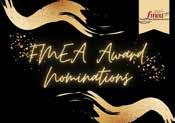
2024-2025 Call for Award Nominations
WHO CAN NOMINATE?
Award candidates can be nominated in any of the following ways:
w Self-nomination (Music Service Award, 50-Year Member Award, and Enrollment Award are typically self-nominated)
w Nomination by any FMEA member
w Nomination by any FMEA component association
w Nomination by the Awards Committee
NOMINATION DEADLINES
w Most award nominations are due Wednesday, September 11, 2024.
w The Music Education Service Award (25 year and 50 year) and Music Enrollment Awards are due Thursday, October 31, 2024.
Each award will be given only when exemplary nominations are received. Not all awards are necessarily awarded annually.
AWARDS
February/March 2024 29

MUSIC ENROLLMENT AWARDS
The Middle and High School Music Enrollment Award is presented to music programs demonstrating high enrollment in music courses. This award recognizes the effectiveness of programs that offer attractive music curricula as well as those that excel in the recruitment and retention of students. Schools hold the award for three years. They may be looked to as models of quality programming, scheduling, and recruitment and retention of students. In order to qualify for this award, at least 30% at the high school level and 45% at the middle school level of the entire student body must be enrolled in a music course.
Middle Schools:
Apopka Memorial Middle School – 45%
Orange County Public Schools
Principal: Lisa James
Music Educators: Carol Kelly, Robb Ross
Roberto Clemente Middle School – 45%
Orange County Public Schools
Principal: Andrew Agudo
Music Educators: Luis Esquilin, Madison Ickes
Manatee Middle School – 47%
Collier County Public Schools
Principal: Matthew Dyer
Music Educators: Stephen Detjen, Elizabeth LoGiudice
Chain of Lakes Middle School – 48%
Orange County Public Schools
Principal: Dr. Bob Walker
Music Educators: Simone Sharrieff, Kevin Strang, Nathan West
R. Dan Nolan Middle School – 49%
The School District of Manatee County
Principal: Scott Cooper
Music Educators: Payton Liebe, Mike Reynolds, Jade Willitt
Clearwater Fundamental Middle School – 50%
Pinellas County Schools
Principal: Stephanie Joyner
Music Educators: Abbey Duncan, Calista Zebley
Wolf Lake Middle School – 52%
Orange County Public Schools
Principal: Cynthia Haupt
Music Educators: Halle Hoskins, Charles Kelly, David Laniewski
SunRidge Middle School – 53%
Orange County Public Schools
Principal: Amy McHale
Music Educators: Lisa Loucks, Rhea Parks-Smith, Missie Westerman
Florida Christian School – 54%
Miami-Dade County
Principal: Patricia Perez
Music Educators: Mitchell Curry, Austin Tindall, Jeannine Stemmer
Lakeland Christian School – 55%
Polk County
Principal: Bryant Black
Music Educators: Wendy Carl, Kathy Johnson, Michelle Manzi, Mindi Mulligan
Southwest Middle School – 57%
Brevard Public Schools
Principal: Jasmine DeLaughter
Music Educators: Crystal Golinello, Ashley Hart, Thomas Silliman, Ashley Tavarez
Benito Middle School – 59%
Hillsborough County Public Schools
Principal: Brent Williams
Music Educators: Brandi Dean, Elise Prather, Eric Scharf
Bridgewater Middle School – 61%
Orange County Public Schools
Principal: Amy Klaber
Music Educators: Daniel Cortolillo, Christiane Lynch, Kyle Sargent, Aaron Wiggins
South Creek Middle School – 62%
Orange County Public Schools
Principal: Lovely Tinsley
Music Educators: Earnest LaBee, Marisa Ledbetter, Daniel Maldonado
Martinez Middle School – 63%
Hillsborough County Public Schools
Principal: Toby R. Johnson
Music Educators: Robert DeLoach, Rene Escamilla, Christopher Johns-Klein
Creative Learning Academy – 64%
Escambia County
Principal: Kim Stafford
Music Educators: Abigail Walker
30 Florida Music Director

Mariner Middle School – 70%
The School District of Lee County
Principal: Mason Clark
Music Educators: Jasmine Batista, Darren Nolff
Classical Preparatory School – 74%
Pasco County
Principal: Jasmine Brightman
Music Educators: Brent Lamkin, Trevor Lloyd
Largo Middle IB World School – 88%
High Schools:
Lakeland Christian School – 32%
Polk County
Principal: Bryant Black
Music Educators: Jordan Burks, Wendy Carl, Kathy Johnson, Jill Jones, Lorraine Latham, Michelle Manzi, Mindi Mulligan
University High School – 32%
Orange County Public Schools
Principal: Thomas Ott
Music Educators: Carmen Aquino, Jonathan Brown, Lisa Coyne, John Dunn, Yelitza Greene, Jeffrey Willis
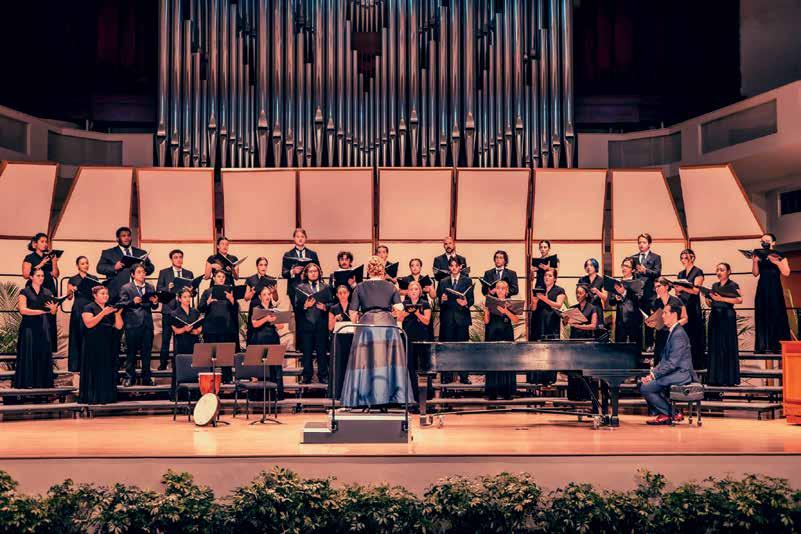
Samuel W. Wolfson School for Advanced Studies – 36%
Duval County Public Schools
Principal: Christopher Begley
Music Educators: Cyriac Adjevi-Neglokpe, Cristina Ledford
Blind High School – 81%
Florida School for the Deaf and the Blind
Principal: Carol Bogue
Music Educators: Leslie Costello, Laurie Wohl



February/March 2024 31
Our school is a reflection of where we live – diverse, vibrant Miami! Here, you will receive conservatory-style training at an affordable Research I University, guided by award-winning faculty in the heart of it all! Full accredited. An All-Steinway School. 10910 SW 17th St., Miami, FL 33199 | music@fiu.edu | @fiumusic | music.fiu.edu The Stage is Set! AUDITION on The Stage is Set! AUDITION on March 16! March 16!
2024 FMEA HALL OF FAME
This prestigious award honors individuals for outstanding contributions over an extended period of time to music and education in Florida, as well as throughout the nation.
J. Mark Scott
2024 HALL OF FAME INDUCTEE
J.Mark Scott graduated with his bachelor’s and master’s degrees in music education from Jacksonville University. He began his teaching career at Highlands Junior High School in Jacksonville. While there, Mr. Scott built the choral program and had more than 300 chorus students by the end of his 13-year tenure. His next assignment was Forrest High School, where the choral program had been shut down for three years. By the end of his 15-year tenure, there were more than 250 students in the program. A highlight of his career was working with profoundly physically and mentally challenged students at Mt. Heman Exceptional Student Center. Mr. Scott completed his career at Fleming Island High School in Clay County. During his 38-year teaching career, Mr. Scott worked with 19 student teachers from four Florida universities.
Mr. Scott was on the Florida Vocal Association’s Executive Board for 23 years, serving as a district chairman, junior high/middle school chairman, and president. He was the chairman of the Past Presidents Council and the Adjudication Committee. He also served both the FVA and FMEA as chairman of the Awards Committee. In 2009, Mr. Scott became the executive director of the Florida Vocal Association and was named executive director emeritus upon his retirement in 2021.
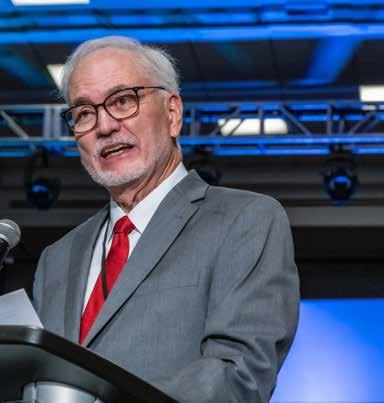
In 1998, Mr. Scott was named Duval County Teacher of the Year. He was inducted into the FVA Hall of Fame in 2016 and received the FMEA Leadership Award in 2020. In 2023, Mr. Scott received the John Rose Mentorship Award.
A firm believer that the arts, and particularly music, are a vital part of a complete education, Mr. Scott continues to mentor new teachers and to advocate for the arts.
Mr. Scott is married to Brenda, a retired music educator. They have two sons, Adam and Matthew, and a daughter (in law) Tara.
32 Florida Music Director
June M. Hinckley Music Education Scholarship
The Florida Music Education Association (FMEA) is soliciting scholarship applications for the June M. Hinckley Music Education Scholarship. The association will award $1,000 scholarships to selected 2023-24 graduating high school students who were accepted to a Florida all-state ensemble and who intend to major in music education at a Florida college or university.
How to Apply: Fill out the online application. As part of the online process, you will be asked to upload these files:
w Essay: Answer both of the following questions in a typed response of approximately 1,200 words: (1) Why do you wish to become a music educator? (2) Why should music be available to all students? Save it as a Microsoft Word (.docx) or PDF (.pdf) file.
w Three Letters of Recommendation signed and scanned as PDF files.
w High-Quality Headshot Photograph such as your senior photo or similar. This will be published in the Florida Music Director magazine if you are one of the scholarship winners. APPLY HERE
An OFFICIAL COPY of your transcript (must remain sealed) must be sent to the following address:
June M. Hinckley Music Education Scholarship
Attn: Val Anderson
402 Office Plaza
Tallahassee, FL 32301
Postmark Deadline: April 19, 2024
Applications will be reviewed by a representative committee of teachers, administrators, and music educators convened by FMEA. Notification will be made by May 30, 2024. Monies awarded will be distributed to the appropriate college or university once the student is enrolled.
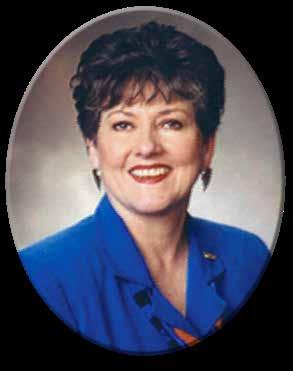
About June M. Hinckley
As arts education specialist for the Florida Department of Education, June Hinckley led the development of the Sunshine State Standards for the Arts, which are based on the National Arts Standards and were adopted by the Florida State Board of Education in 1996. Hinckley assisted schools and school districts with the implementation of the arts standards and with connecting the arts with the state accountability and testing program, and she served as a liaison among the various K-12 arts education groups, higher education, and community arts organizations. She was a founding organizer of the Arts for a Complete Education project, which has coalesced the various community, industry, and school arts organizations in Florida to work cooperatively and proactively to improve the quality and quantity of arts programs throughout the state.
February/March 2024 33
APPLY NOW
Empowering Student Leaders for Success Cultivating Leadership, People Skills, and Autonomy in Band Programs
SSelecting a leadership team is universally recognized as a critical aspect of band programs and can hold similar importance in all music programs. However, despite its significance, many music programs fail to equip students with the necessary leadership tools before the actual selection process. Offering a single day of preparation for prospective leaders is not sufficient for cultivating the essential skills required for an effective and successful leadership team. Leadership identity is the way that we, as humans, deal with and perceive challenges and opportunities as they occur. Each person has a different identity in how they lead through adversity or success. This is something that requires a process of observation and reflection as people uncover more about themselves (Komives, 2005).
As directors, we wouldn’t expect a soloist to perform flawlessly without ample practice and rehearsal, so why does this process not apply to student leaders? We must
by Alexander Buck
provide them adequate time and guidance to develop their leadership, communication, and decision-making skills. Moreover, relying solely on so-called “natural leaders” isn’t always enough to ensure the success of a leadership team. Leadership is a skill that can be learned and honed through education, experience, and mentorship. To ensure the success and effectiveness of the team, directors should provide students with the necessary leadership tools and ample time for preparation. Investing in the development of student leaders, regardless of their initial leadership aptitude, not only enhances their abilities but also fosters a supportive and dynamic leadership culture within any music program.
Do you truly provide an equal opportunity to all students when selecting your student leadership?
In a study examining leadership in high school marching bands, McLaine (2023) found that 83% of directors select
34 Florida Music Director

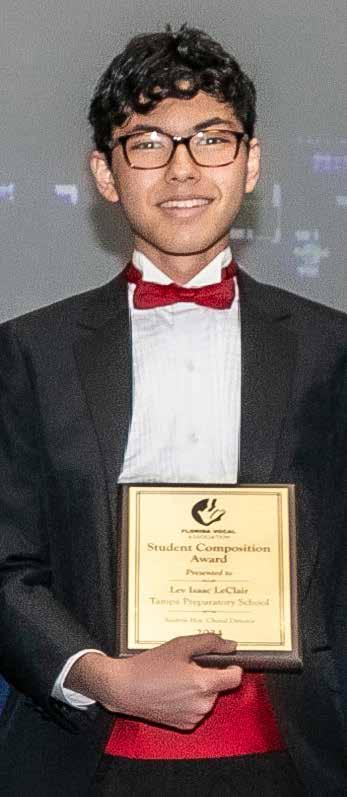
their student leadership through interviews, with only 70% considering playing auditions. This raises an important question: do we, as a profession, prioritize people skills over musical ability when selecting student leaders? If so, why are only some programs actively working on developing these essential skills with our students?
Although we dedicate significant effort to enhancing students’ musical performance abilities, we seem reluctant to invest more time in the most crucial skill, leadership, that they will need for their future whether they pursue music or not. By valuing and actively nurturing their people and leadership skills alongside their musical abilities, we can ensure our students are well prepared to excel as leaders in both music and life.
As music teachers, we should strive to create an environment that allows students to work on and develop their social skills. Consider a remarkable example of a band program that holds weekly leadership meetings
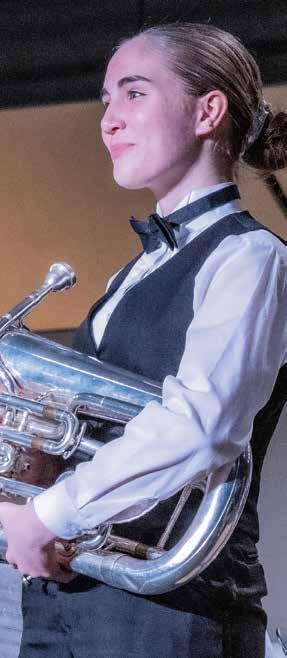
open to the entire band, not just the current leaders. The whole band participates enthusiastically in these optional meetings, focusing on topics beyond music. They explore leadership and people skills, and how these skills can be applied in various aspects of life, not just band. This approach prepares students for interviews and auditions, enabling them to excel and demonstrate the necessary skills for selection.
Surprisingly, McLaine’s (2023) study also revealed that fewer than half of band directors permit all students to engage in activities that nurture and foster leadership skills regardless of their position. In other words, directors only allow active leadership team members to participate in activities that build leadership skills. We must consistently develop students into the leaders we will rely on in the future; isolating them from events that allow them to learn and cultivate skills sets up our future for a continued on page 36
February/March 2024 35
Empowering Student Leaders for Success
continued from page 35
lower-quality team than the alternative. Rather than focusing on short-term skill building, as most do, we should focus on the longer process of creating a leadership identity for all students (Kom ives, 2005). For our programs’ future success, we must embrace the importance of cultivating leadership qualities in all students.
Empowering Student Leaders as Educators
Empowering student leaders as educators is crucial in band programs, as it enhances their leadership roles and benefits the ensemble. Although musical abilities are essential, developing teaching and mentorship skills in student leaders brings lasting advantages within and beyond the band setting. By equipping student leaders to serve as educators, they can inspire and guide their peers, creating a positive and collaborative band culture.
Effective student leaders act as educators who can teach and mentor fellow band members. By providing guidance and cultivating teaching abilities, these leaders can contribute significantly to the growth and improvement of the entire ensemble. When student leaders feel empowered to take on educational roles, it relieves the director of some responsibilities and fosters a supportive learning environment where students actively engage with one another.
Moreover, student leaders enhance their overall effectiveness in guiding the band by developing their communication, leadership, and instructional skills. Their ability to educate their peers strengthens their position as role models and facilitators of positive change. Empowering student leaders as educators helps them take ownership of their roles, instilling a sense of responsibility and commitment to the band’s success. This approach fosters a culture of dedication and mutual support within the ensemble, ultimately leading to improved performances and a more cohesive musical community.
Incorporating educational empowerment in band programs elevates the students’ musical experiences and prepares them for future leadership roles in various contexts. As educators, student leaders develop transferable skills such as adaptability, communication, and collaboration, which are valuable in other aspects of life. By nurturing student leaders as educators, band directors create a lasting impact on their students, enabling them to excel as leaders, teachers, and mentors, both within the band and in their broader communities.
A Simple Step-By-Step Guide to Teaching How to Teach
1. Begin by demonstrating the desired outcome twice.
2. Break down the desired outcome count by count.
3. Have the group attempt the outcome twice.
4. Repeat steps 2 and 3, providing minor, specific fixes with examples.
Though this process is not universal, it sets students up for success. Providing students with something this simple allows them to have a template to follow until they can find an identity. It also allows students some freedom to fail and try again.
Embracing Student Leaders’ Feedback and Promoting Autonomy
Encouraging autonomy among student leaders is a critical factor in fostering their engagement and performance, as supported by Reeve and Tseng’s (2011) research. By giving student leaders a sense of ownership and control over their responsibilities and decision-making, we empower them to take initiative and invest themselves more deeply in the band program. This increased autonomy instills a greater sense of accountability, as they recognize the impact of their choices on the overall success of the ensemble.
Moreover, involving student leaders in meaningful conversations and decision-making processes demonstrates trust and respect for their opinions and ideas. It also allows them to better understand the reasoning behind certain decisions, making them more invested and committed to the programs’ goals. When student leaders feel trusted and valued, they become more motivated to contribute their best efforts and to support the program wholeheartedly. This heightened dedication positively influences their peers, creating a culture of collaboration and teamwork within the band.
Neglecting to incorporate student leaders’ ideas and perspectives would be a missed opportunity to tap into the wealth of creativity and innovative thinking they can offer. As individuals experiencing the daily workings of the band program, they possess invaluable insights into what is working well and what can be improved. By actively seeking their input and implementing their suggestions, we create a more inclusive and empowering environment, where student leaders feel appreciated and motivated to contribute their best.
36 Florida Music Director
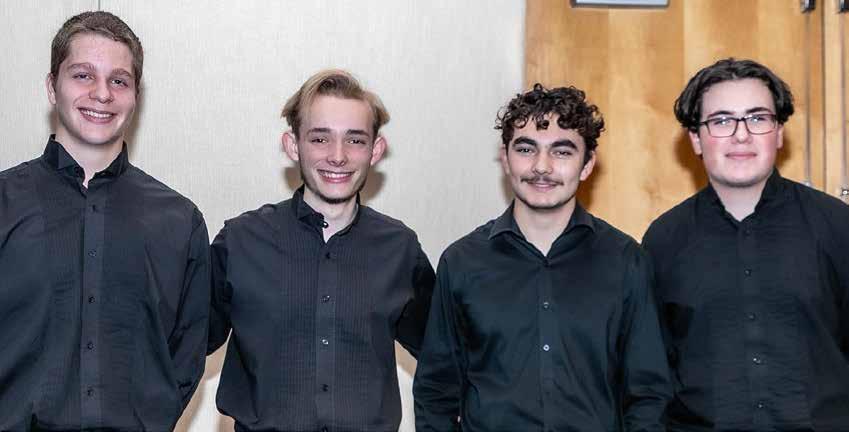
Promoting autonomy and involving student leaders in decision-making enhances their engagement and performance and also cultivates a culture of trust, inspiration, and collaboration within the band program. By valuing their contributions and empowering them to take on leadership roles confidently, we lay the foundation for a successful and thriving musical community.
Establishing Transparent Guidelines for Student Leaders
Setting clear expectations for student leaders involves a collaborative approach to defining roles and responsibilities from the year’s outset. By convening your leadership team and allowing them to review and adjust these roles annually, they can take ownership of their tasks and responsibilities. An essential aspect of setting clear expectations is recognizing the significance of improved communication between you and your student leaders. Please encourage them to approach you regularly for feedback. Remember that you must have fostered an appropriate relationship for them to be comfortable in seeking feedback. These relationships should encompass mutual respect and reciprocal trust that each of you will complete your job (Crans et al., 2022).
Effective communication should be emphasized throughout the band program. Regular updates and open dialogue between student leaders and you will help ensure everyone is on the same page. Providing feedback and evaluations at regular intervals not only acknowledges their achievements but also offers constructive guidance for improvement.
Creating a supportive and empowering environment is vital in helping student leaders feel confident in their roles and responsibilities. When they take ownership and feel trusted, they are better equipped to lead the band with dedication and success. By setting clear expectations and fostering a collaborative, communicative, and supportive atmosphere, you will enable your student leaders to thrive and contribute significantly to the overall success of the band program.
Alexander Buck is in his sixth year of teaching at Fleming Island High School in Fleming Island, Florida. He received the BME from the University of Florida and is pursuing the MME from Florida State University.
References

Crans, S., Aksentieva, P., Beausaert, S. & Segers, M. (2022) Learning leadership and feedback seeking behavior: Leadership that spurs feedback seeking. Frontiers in Psychology, 13, 1–17. https://doi.org/10.3389/fpsyg.2022.890861
Komives, S. R., Owen, J. E., Longerbeam, S. D., Mainella, F. C., & Osteen, L. (2005). Developing a leadership identity: A grounded theory. Journal of College Student Development, 46(6), 593–611. https://doi.org/10.1353/csd.2005.0061
McLaine, T. J. (2023). Student leadership in high school marching bands: A descriptive study (Publication No. 30311456) [Master’s thesis, Florida State University]. ProQuest Dissertations and Theses Global.
Reeve, J., & Tseng, C. M. (2011). Agency as a fourth aspect of students’ engagement during learning activities. Contemporary Educational Psychology, 36(4), 257–267. https://doi.org/10.1016/j. cedpsych.2011.05.002
February/March 2024 37

Creating the Environment That Controls Us


 by Kaleb Switanek
by Kaleb Switanek
W“We create the environment that in turn controls us” (Madsen & Madsen, 2016, p. 61). Anyone who has had the privilege of hearing a lecture by Dr. Clifford Madsen or has read his book Teaching/Discipline: A Positive Approach for Education Development is bound to recognize these words. Although this could apply to the organization and physical processes of your classroom, I argue that this quote encompasses much more. Teachers are inundated with so much information at the start of each school year, including school policies and procedures, instrument library, and music selection. This list could go on and on. I believe one of the most important questions music educators need to ask themselves is “What kind of environment do I want to establish so my students feel welcomed and successful?” This article not only serves as a pre-planning tool for new or future educators, but also to encourage existing educators to reflect on topics related to improving the classroom environment.
Building/Fostering Relationships
Many educators are familiar with the quote “Students don’t care how much you know until they know how much you care.” This quote perfectly captures the importance of prioritizing the teacher-student relationship. Additionally, Hayes et al. (1994) stated that in order to develop a sense of caring for the students in our classrooms, we must take the time to get to know them. Forming meaningful relationships between teachers and students is paramount in the educational process. Going beyond traditional classroom instruction will help to foster an environment of trust, support, and understanding.
continued on page 40

38 Florida Music Director
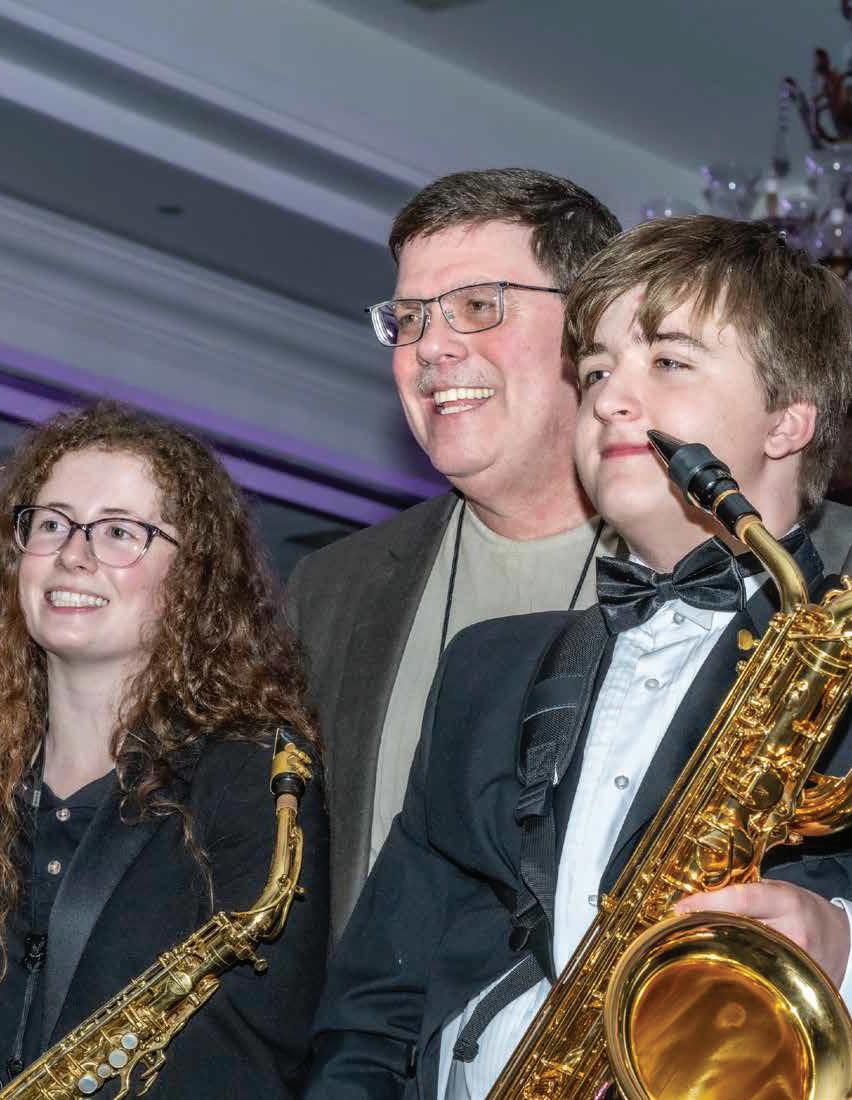
Creating the Environment That Controls Us
continued from page 38
When teachers prioritize these connections, students feel valued, respected, and more engaged in their learning. This positively impacts their academic achievements as they actively seek guidance and want to participate in class discussions. This nurturing space allows students to share their concerns, enabling teachers to address their individual needs holistically.
I challenge in-service teachers to reflect on how well they know the current individuals sitting in their classroom beyond the academic level. What are their hobbies? Do they participate in sports? How do they like to spend their free time? What is something fun they did over the weekend? I think it is vital we frequently remind ourselves that we teach people, not just “students.”
For preservice and in-service teachers alike, I would like to offer a strategy shared with me by one of my administrators called the 2x10 Relationship Building Strategy. Not only was this a game changer in my teaching, but it positively impacted my classroom environment in many ways. For anyone who may be unfamiliar with this strategy, the idea behind it is this:
1. Identify the teacher-student relationship you wish to improve.
2. Find two minutes you are willing to spare and have a conversation with them about anything other than your class. This could be as simple as asking them one of the questions listed above. Remember:
• Stay engaged.
• Keep the conversation positive.
• Be authentic.
3. Continue these two-minute conversations for 10 consecutive days.
4. Reflect on how this has changed your teacher-student relationship.
Room Setup
First impressions should not be taken lightly. I mentioned earlier that our environment goes beyond the physical organization of our classrooms, but I would be remiss to overlook this aspect entirely. Our classrooms are often the vehicle for first impressions to students and guests. An orderly classroom can lead students to perceive the teacher as competent and well prepared. This perception can enhance students’ respect for the teacher and increase their motivation to learn and seek guidance from them. To be clear, everyone functions differently, and no situation
is going to look the same. Just because a colleague in your county has their room organized a certain way does not mean you have to do it that way as well. It is essential you find what works for you, your situation, and your students. If you are still in the process of figuring out what works best for you, consider these questions:
w What type of first impression do you want your classroom to make?
w How will you set up your room to achieve the desired impression you’re looking for?
w When students enter the classroom, do you prefer to have the chairs and stands set up in advance or do you task your students with arranging and disassembling the ensemble configuration for each class period?
w Is there a designated spot for chairs and stands to be set up? To be put away?
w Should students keep backpacks and cases by their chair? If not, where should they go?
Please note that these are just a few questions to encourage you to think about your setup and process. There are many more you could ask yourself. Furthermore, some of the questions above are broad and can be explored at a much finer level. The answers to the questions can change from teacher to teacher, year to year, and even class period to class period. Find what works best for you!
Expectations
The key to a thriving classroom environment is having clear and realistic expectations. They are behind every aspect of what we do and why we do it. Setting expectations for students helps shape their educational journey and experience while simultaneously acting as a powerful force that drives motivation, cultivates responsibility and accountability, fights against ambiguity, and fosters a positive and engaging learning space. As the guiding force that shapes behavior, academic performance, and character development, expectations empower both teachers and students to embrace the school year with confidence and purpose. But what expectations should be in place? Who gets to decide what expectations should be established? These thought-provoking questions are elusive to a simple “right” or “wrong” answer.
In my classroom, I firmly believe in and value student input. After frequent reflection on the topic of expectations, I propose there are three main categories: (1) teacher to student, (2) student to teacher, (3) student to student.
40 Florida Music Director

After having this realization, I begin each school year with a class discussion on the following three questions:
1. What do you (the student) expect from me (the teacher)?
2. What do I (the teacher) expect from you (the student)?
3. What should you (the student) expect from each other (their classmates)?
It is important to note that these questions change from year-to-year and class-to-class because the discussions are student driven.
I will be the first to admit that I have my own answers to each of these three questions, but if I set all the expectations, it robs my students of their individual voice. That is not something I am comfortable doing. My role in this process, as the educator and guide in the room, is to take their answers and ensure they remain consistently enforced throughout the school year. I do this by strategically and periodically reminding them of our discussion throughout our time together. Ultimately, the goal of our initial discussion is to promote student ownership so they have greater buy-in to our classroom environment, as they feel like they had a hand in creating it.
Reflection
As educators, our ability to reflect is an indispensable tool when evaluating the efficacy and sustainability of our classroom environments. I cannot stress enough how important it is for any educator at any level to find a moment to pause, decompress, and engage in reflection. This process allows us to better understand the intricacies of our educational approaches and their impact on the students’ learning experiences.
To do this, we must first observe and collect data on our
physical spaces, the reactions by both us and our students, the behaviors in our classroom, and our own thoughts and feelings (Duke, 2017). By asking ourselves questions such as “What went well?” we identify the effective strategies and practices that contribute to a positive classroom atmosphere. This, in turn, enables us to reinforce those aspects that foster active engagement, collaboration, and enthusiasm among students. Equally vital is reflecting on the elements that did not meet our expectations and exploring the underlying reasons. Understanding the challenges faced in the classroom environment empowers us to adapt, innovate, and implement appropriate measures for improvement. By harnessing the power of reflection, educators can create a vibrant and inclusive learning space where students feel motivated, supported, and empowered to reach their fullest potential.
Kaleb Switanek, BME , is pursuing a master’s degree in music education from Florida State University and is the band director at Lake Butler Middle School in Union County. His teaching responsibilities include three levels of band, fifth grade general music, and three levels of percussion ensemble.
References

Duke, R. A. (2017). Intelligent music teaching: essays on the core principles of effective instruction. Learning and Behavior Resources.
Hayes, C. B., Ryan, A., & Zseller, E. B. (1994). The middle school child’s perceptions of caring teachers. American Journal of Education, 103(1), 1–19. http://www.jstor.org/stable/1085497 Madsen, C. K., & Madsen, C. H. (2016). Teaching/discipline: A positive approach for educational development (5th ed.). Contemporary Publishing Company.
Febr uary/March 2024 41
FLORIDA MUSIC EDUCATION ASSOCIATION
2023-2024 DONORS
Thank you to all of the donors who have shown their dedication to the improvement of music education in Florida by supporting our Mission through financial contributions.
Our donors support specific causes by donating to the FMEA funds of their choice:
FMEA Scholarship Fund
Music Education Advocacy General Fund
June M. Hinckley Scholarship
Professional Development for Members
Mel & Sally Schiff Music Education Relief Fund
The following have graciously donated to FMEA from April 1, 2023, through February 9, 2024.
MAESTRO’S CIRCLE
$10,000 and up
No current donors at this time.
Carlos Abril
In Honor of Dr. Joyce Jordan
Andre Arrouet
In Memory of Dr. James Croft
Lucinda Balistreri
Alice-Ann Darrow
In Memory of Mr. & Mrs. O.B. Darrow
Virginia Densmore
In Honor of Dr. Shelby Chipman
Virginia Dickert
In Memory of Lindsay Wells, Teri Wester, & Debbie Liles
Michael Dye
In Honor of Mark & Brenda Scott for their lifetime dedication to Florida vocal music education
Shelby Fullerton
In Memory of Dan Fullerton
Rita Hersom
In Memory of Billy Bryant, Jr.
Marsha Juday
Sheila King
In Memory of John W. King
ARTIST’S CIRCLE
$1,000 – $9,999
All County Music
Artie Almeida
In Honor of June Audrey Grace & Katie Grace Miller
SUSTAINERS
$100 – $999
Jason Locker
In Memory of June M. Hinckley
Kevin Lusk
Brenda McGlohon Mitchell
In Memory of Dorothy Wells Skinner
Carolyn Minear
In Memory of Alice Fague
John Nista
On Behalf of Stanley Dmitrenko
David Pletincks
In Honor of Alexis & Jonnie Pletincks
Jeanne Reynolds
In Honor of Pinellas County
Performing Arts Teachers
Mary Catherine Salo
In Memory of Gary Rivenbark & Wes Rainer
Steven Salo
In Honor of Dr. William Prince & John “Buck” Jamison
Kathleen Sanz
In Memory of June Hinckley
Fred Schiff
Clifford Madsen
Mary Palmer Russell Robinson
J. Mark Scott
In Dedication to Dr. Andre Thomas, Dr. Judy Arthur, Dr. Judy Bowers, & Jason Locker
D. Gregory Springer
Harry Spyker
In Honor of Fred & Marlene Miller
Alan Skaggs
Jeannine Stemmer
In Memory of Barbara Kingman & Lauren Alonso
Leiland Theriot
Richard Uhler
David Verdoni
Howard Weinstein
In Memory of Barry Weinstein
Doris Elaine Wells
In Memory of Dorothy Wells Skinner
Kenneth Williams
Daniel Wood
In Memory of Robert W. Smith
42 Florida Music Director
Sandra Adorno
Michael Antmann
Judy Arthur
Sasha Aufschneider
Gale Baker
In Memory of William Bryant, Jr.
Garza Baldwin
In Memory of Dorothy Wells Skinner
William Bauer
David Bayardelle
In Honor of Harry Spyker
Mark Belfast
In Memory of Dr. Mark A. Belfast, Sr.
Johnathan Bosse
In Honor of Rosanne and Michael Bosse
Melanie Brown
In Memory of Dorothy Skinner
Jamie Bryan
Kasia Bugaj
Christopher Burns
Stanley Butts
Greg Carswell
On Behalf of all the Florida choral directors who have passed on Jeff Cayer
Shelby Chipman
In Memory of Herbert Rhodes, Sr.
Blair Clawson
In Honor of Tina Mason
Dayna Cole
In Memory of Linda Mann
Deborah Confredo
In Honor of All the Music Educators of FMEA
PATRONS
$25 – $99
Scott Evans
Bradley Franks
In Memory of Gary W. Rivenbark
Anna Marie Friars
In Memory of Matthew McLaughlin
Sandra Geres
In Memory of Dorothy Wells Skinner
Dakeyan Graham
Cynthia Heidel
Bernie Hendricks
Alexis Hobbs
Jacob Hyer
Martha Huntley
In Memory of Dorothy Skinner, Safety Harbor, FL
Alexander Jimenez
Aaron Kass
Mary Keyloun Cruz
In Memory of George Keyloun & Pauline Antaki
Cynthia Kohanek
Christine Lapka
Joseph Luechauer
Deborah Mar
In Memory of Barbara Kingman
Matthew McCutchen
In Honor of John Carmichael
Kelly Miller
Victor Mongillo
Daniel Murphy
In Memory of Billy Bryant
Stephen Nelson
Marialyce Orr
In Memory of Robert & Bonnie Bragg
FRIENDS
up to $24
Michael Belyea
Crystal Berner
Thomas Brown
In Dedication to Dr. Sanmel A. Floyd
Ernesta Chicklowski
Eduard Ciobotaru
Beth Ann Delmar
Jodie Donahoo
Christopher Dunn
Debbie Fahmie
Dretha Fennell
Thomas Gamache
Tina Gill
In Memory of Gary Rivenbark
Alvaro Gomez
Edepson Gonzalez
James Haggins
Angela Hartvigsen
William Hazlett
Llewellyn Humphrey
Arnekua Jackson
Kathleen James
Jason Jerald
Marsha Kindall-Smith
Celeste Laburda
In Honor of Eleanora Fagan
Pauline Latorre
Lu Anne Leone
Gerald Madrinan
P. L. Malcolm
John Marshall
Khemya Mitrahina
Merleon Morgan
Mary Palmer
Mikael Patriarca
Hank Phillips
Ashley Peek
Justin Plante
Edward Prasse
Marie Radloff
Clinton Randles
Melissa Rawls
In Honor of Nancy Bartels
C. William Renfroe
In Memory of James O. Johnston & Herbert Beam
William Rose
Cheri Sleeper
Eddie Steadman
Mark Stevens
In Honor of Dr. Clifford Madsen
Valerie Terry
Kathleen Thompson
Ellen Turko
In Memory of Billy Bryant
Matthew Weihmuller
Elizabeth Weir
Sondra Wenninger Collins
Seth Wexler
In Honor of Mr. James Monroe
Edith Wright
Anonymous (6)
On Behalf of Derek Schaumann’s Birthday
In Honor of Columbia County
Music Teachers
In Memory of Carol Pollock
Alexandra Rameau
Ian Schwindt
John Southall
Kelly Southall
Ajori Spencer
Hailey Swanson
Phil Tempkins
In Memory of Susan McCray
Lindsey Williams
Anonymous (14)
In Memory of William Bryant, Jr.
February/March 2024 43
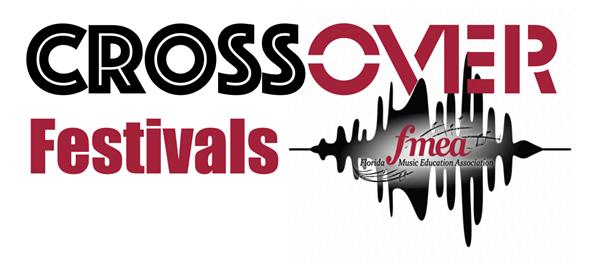
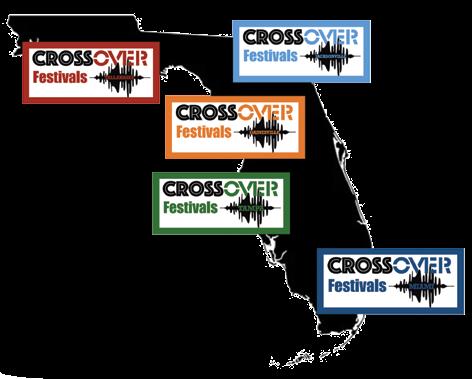
The Florida Music Education Association Crossover Festivals are designed to encourage musical creativity, critical thinking, and collaboration by students in K-12 schools. Teachers are welcome to bring their student bands to a festival experience that will celebrate their students’ achievements in the area of cover song and original song performance. Students will perform a 10-minute set of cover and original music and then have a 30-minute coaching session by a music teacher producer from the hosting institution. Students should plan on spending the day to hear other bands perform and experience the unique program of each host institution. There will be performances from university students, presentations from members of the music industry, and valuable Q&A sessions for how to make better music. All student performances will be professionally multitrack-recorded. At the end of each festival, two bands will be awarded the honor of having one of their original songs released on a special album following the Festivals.
SITE LOCATIONS
Jacksonville (University of North Florida) ............... May 11
Gainesville (University of Florida) ............................ May 11
Miami (Florida International University) ...................................................May 4
Tallahassee (Florida State University) ...................... May 11
Tampa (University of South Florida) ................ May 18
44 Florida Music Director
MORE INFORMATION
Component News
FLORIDA VOCAL ASSOCIATION
David Pletincks President

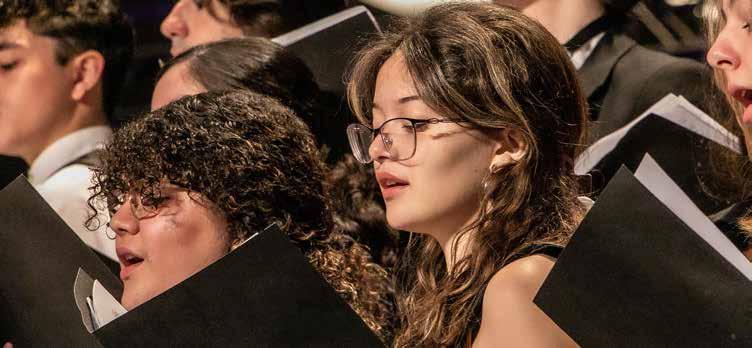
It’sthat time of year again, MPA season. For most of us, the thought of attending MPA each spring triggers a myriad of emotions. We work all year teaching our students to sing with good tone, to sing musically and expressively, and to be the best choral musicians they can be. We start the beginning of each year full of energy and excitement. Our primary mindset in August is not how we will do at MPA; it’s about instilling a love of choral music and the joy of singing.
There are so many aspects to MPA, I can’t possibly begin to address everything in one article. Perspective is very important though. In my 27 years in the classroom, my perspective has changed dramatically.
I remember being in the FBA office at district MPA 30 years ago after my band had just performed on stage. A veteran middle school band director came into the room and said, “It’s a shame that we base the success of our careers on one performance, on one day, by a group of 13-to 14-year-olds.” He went on to tell us that his first-chair saxophone player just broke up with his first-chair flute player … in the warm-up room. His first-chair flute player was sobbing all through their warm-up, and all of her friends in the band were furious.
His assessment may seem extreme, but for too many directors, it’s exactly how they feel. That one performance was determining whether the year was a success or not. It was certainly what I was feeling as a new teacher. MPA is one performance, on one given day. It’s one snapshot of our program out of the entire album of rehearsals and performances throughout the year.
We want to believe that if we train our students properly throughout the year, they will display that instruction on the MPA stage. Those of us who have been around for many years have experienced those one-time performance anomalies. Like the time my trumpet section entered two measures early with a beautiful fanfare section. Never happened before, but it happened on MPA day. Or the time my advanced treble choir inexplicably sang everything under pitch. That was a terrifying seven minutes.
We have the power to establish the culture we want in our programs, the level of importance we place on MPA and the rating our ensemble receives. A couple years ago, after hearing so many directors talk about limiting the discussion in class regarding MPA ratings, I didn’t talk ratings at all. We talked all semester about the importance of adding all the musical aspects to our music, not just to get a higher rating, but because that’s how we can make our performance the best it can be. We boarded the bus after MPA, I told my beginning choir what their ratings were, and they all just sat there. Then one sixth grader said, “What does that mean?”
MPA can be an invaluable measuring stick for where your program is at a specific time. We have the power to take every performance and make it a unique educational experience for our students.
Perspective. It makes all the difference. Prepare your students to be the best musicians they can be, then enjoy the day.
February/March 2024 45
Component News
Wow!What a way to welcome in the new year! I hope all of our FMEA and FEMEA members are just as excited after coming back from this year’s topnotch conference. I know I always come back fired up and ready to tackle the new semester.

FLORIDA ELEMENTARY MUSIC EDUCATORS ASSOCIATION
Ashley Peek President

I’d like to take a moment to reflect before we move to the hustle and bustle of the spring months of our school year (which we all know are some of the most hectic months in music education). Among all the incredible highlights of this conference, our two phenomenal elementary all-state ensembles are certainly
FLORIDA BANDMASTERS ASSOCIATION
Bernard (Bernie) Hendricks, Jr. President
Afunny thing happened to me a while back. An acquaintance of mine said to me, “Well, things will slow down for you now that football season is over, right?” I replied, “I’m a high school band director. There’s really no such thing as slow down!” You can insert music educator where I said band director because we are always preparing for the “next thing,” which is one of the beauties and also one of the stress points of our profession. It’s March, and in just a few short weeks, we’ll get a little down time with spring break. I hope you will plan and partake in some much deserved “you time” during the break. The load of a music educator can be heavy, but when you have people who share in moving said load along, it makes a world of difference. With that in mind, as we are all in the midst of MPAs, spring concerts, musicals, recruitment performances, and anything else you can think of, remember to surround yourself with people who will lift you up and not pull you down. Be intentional and contact people to assist you, as well as assist others yourself. That is what makes our profession special, especially here in the state of Florida.
I mentioned before that MPAs are in full swing. Many of us will once again stress ourselves out about the opinion of a few respected individuals at one given moment in time. It’s a viable snapshot of what’s going on, but it’s not the full picture … and it’s not meant to be a full view of your entire program. So, I urge everyone to prepare as best you can but never lose the joy of inspiring young people to grow as musicians and as people. Because in most cases we have our students for multiple years, our words of encouragement are super important to them, and for many, we may be the only encouragement they receive. So yes, work hard, take care of yourself, inspire the next generation of music educators and world leaders, and oh, by the way … have fun doing it!
Lastly, an afternoon sitting and listening to any MPA makes for a successful day. Much can be learned from watching and supporting one another as we work through this season. Get out and listen! We tell our students this all the time, so let’s model the behavior we want to see. Plus, it’s a great opportunity to connect with our colleagues and continue to build our community!
Be blessed, everyone, and enjoy the journey!
at the top of my list. Our elementary allstate choir, led by sought-after choral clinician Dena Byers, was a beautiful kickoff to the all-state ensembles of the week. Debuting a poignant, fun, and touching original work by composer Alex Gartner, our all-state students brought tears to our eyes. Our Orff ensemble on Friday brought an equal amount of passion and artistry, led by dynamic duo Christopher Giles and Michael Vasquez. Watching the talent and professionalism of these young students was inspiring. I would like to thank everyone involved in making these ensembles happen. It is a true team effort, and the dedication and success of our all-state teams has brought life-changing experiences for many students across the state of Florida.
Our conference sessions shone extremely bright as well. The variety of sessions I was able to attend was wonderful; from Kodály, Orff, and Dalcroze to ukuleles, recorders, and more. Thank you to our sponsors, Peripole and West Music. Your dedication to music education and to our conference is immensely appreciated. Thank you for providing session rooms and all-state instruments, as well as sponsoring this year’s superb headliners, Jennifer Donovan and Sue Mueller. The sessions by these talented presenters were inspiring.
These experiences do not come together without an incredible team, and I want to be sure to thank the entire FEMEA Executive Board for their willingness to serve and for the many hours of work they put in to help make this conference a success.
And to every single teacher who attended this year’s conference, thank you for your dedication to music education. I hope you all left this conference with new ideas, joyful memories, and the fire to continue the semester on a high note.
46 Florida Music Director
FLORIDA ORCHESTRA ASSOCIATION
Cheri A. Sleeper President
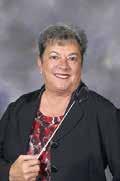
Our 2024 FMEA Professional Development Conference and All-State Concerts have come and gone. What a wonderful, musical time we had. Great performances by all our all-state ensembles as well as performances by our many fine music programs from around the state. Great music and so many great sessions presented by our colleagues are what sets Florida above the rest. I would be remiss if I did not take a moment to thank our outstanding all-state orchestra coordinators—Mary Lubaroff, Jennifer Erickson, Katherine Ng, Lauren Pardee, and Jarrod Koskoski. Without their dedication and tireless work, the success of our all-state ensembles would not be possible. Also, thank you to the members for attending our FOA general membership meeting and congratulations to those who will be serving our all-state ensembles next year:
Katherine Ng.................................................. 9/10 All-State Concert Orchestra Coordinator
Samantha Felber 9/12 Honors Orchestra Coordinator
Marcey Sperr ........................................ 7/8 Middle School All-State Orchestra Coordinator
With the conclusion of the FMEA conference, we now head into MPA season. Help your hard-working, dedicated district chairpersons by staying mindful of deadlines (title changes, etc.). If you aren’t sure of something, check the handbook. Speaking of deadlines, if you are planning on attending any of the state MPAs, please be aware of the following deadlines:
w March 1 – State Solo & Ensemble MPA application postmark deadline. Applications postmarked after this date will incur a late fee.
w March 23 – State Solo & Ensemble MPA at Strawberry Crest High School, Dover, Florida
w March 25 – State Concert MPA postmark deadline. Applications postmarked after this date will incur a late fee.
w April 15-17 – State Concert MPA at Blake High School, Tampa, Florida
I know how busy this time of year can be as you prepare for MPA, but please try to take time and reach out to people who are new in your district. It may be their first time going to MPA, and they could use some helpful hints and guidance, not only in preparations, but also in maneuvering the policies in place for MPA, especially things like remembering to number the scores!
As always, please feel free to contact any of us on the board with your concerns or questions. We are at your service. I wish you the best in this MPA season and look forward to seeing many of you at our state events.
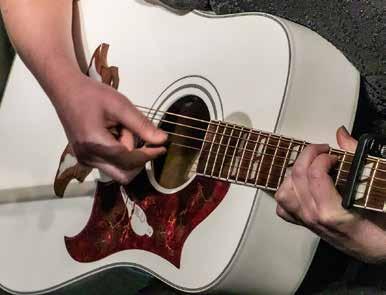
Guitar Ensemble Festival
The FMEA Guitar Ensemble Festival is a day full of guitar activity, including ensemble performances from elementary, middle, and high school programs. Ensembles of all levels of experience perform for NO RATINGS and receive instant feedback in areas of technique, tone, musicality, and musical interpretation.
2024 Festival Sites
w March 30, 2024: University High School, Orange County, Orlando
w April 6, 2024: American Heritage School, Broward County, Plantation
Performance Options
w Solo: Perform one piece in a 10-minute timeslot for evaluation. $12 entry fee.
w Small Ensemble: Perform one piece in a 10-minute timeslot for evaluation. $10 per performer, maximum eight performers.
w 30-Minute Ensemble Workshop: Perform two pieces in a 30-minute workshop setting. $200 entry fee.
w 60-Minute Ensemble Workshop: Perform three pieces in a 60-minute workshop setting. $400 entry fee.
Deadline
Checks and signed entry forms must arrive at the FMEA office 14 days prior to the festival date of the site you choose to attend. Credit card payments are not available for the festival entry fees at this time, so please plan accordingly.
Enter the Guitar Ensemble Festival HERE
February/March 2024 47
Component News
Pay It Forward
by Patricia Gingras, PhD
Thenews from the academic advisor at the end of my freshman year came as a shock. “Nope, sorry! You cannot pursue a degree in instrumental music education. You are a pianist!” (All music students followed the same curriculum for two semesters and then enrolled in a specific degree program beginning their sophomore year.)
I protested, “Piano is an instrument.”
The advisor replied, “Maybe … but the department chair made the rule. Choose a different degree or switch to another instrument.”
“I practiced 13 years to get into this music school. How can I, overnight, miraculously become equally competent on another instrument?”
The advisor sighed and suggested, “There aren’t many percussion students. Why don’t you ask Dr. Tanner (aka Dr. T.) if he’ll take you?”
“Yeah, sure. Dr. T. is going to be excited when a pianist asks to join his exclusive percussion studio,” I thought as I trudged across campus for this decidedly worthless conversation. All of my band and orchestra director dreams ebbed away as I knocked on Dr. T.’s office door.
After hearing my tale of woe, Dr. T. queried, “Can you play a marimba?” My response almost sealed my doom. “What’s a marimba?” (A question that haunts me to this day.) Rather than banish me from his presence, Dr. T. introduced me to a marimba, provided music, and handed me two mallets. “Play,” he said. I played. Not exceedingly well, but good enough for Dr. T. to cut me a deal. He would loan me the marimba for the summer. I would take weekly lessons and practice, practice, practice. In the fall, I could join the studio.
FLORIDA NAfME COLLEGIATE
Mark A. Belfast, Jr., PhD Advisor

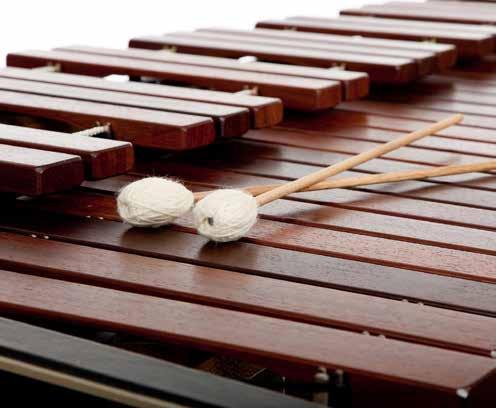
It was the chance of a lifetime. I took it. You would not be reading this missive today if Dr. T. had not given me one of the biggest “breaks” of my life. That event, combined with the grace he displayed, compels me to seek a solution each time a student is linked to a seemingly unnavigable situation. These have most recently included:
w Recording and uploading a semester’s worth of methods classes to allow a working, non-certified music teacher to complete the last course needed to earn her certification.
w Noticing that a vocal auditionee, who was denied admission, wore a marching uniform in her application photo and arranging a second, very successful instrumental audition.
w Instructing a student teacher with great promise who, for whatever reason, totally tanked his final internship observation to “go eat a giant ham-
burger, get some sleep, and we will do this again tomorrow.”
w And, yes … creating a pathway for pianists to pursue a degree in instrumental music education.
We all face daily challenges and complicated student situations. We operate amidst the constraints of policies, procedures, unwritten rules, and established traditions. Let’s be, and continue to be, ever vigilant educators who also ask, “What can I do, in this unique situation, to help connect this student to his/her/their dreams?” Together, we can collectively pay it forward, Dr. T. style.
Patricia (Ticia) Gingras, PhD, serves as program coordinator for music education at Florida Gulf Coast University and is the faculty advisor for the national award-winning FGCU NAfME Collegiate chapter.

48 Florida Music Director
FLORIDA MUSIC SUPERVISION ASSOCIATION
Christopher Burns, PhD President
Thisyear’s FMEA Professional Development Conference marked a significant milestone in the journey of music education within our state. As the president of the Florida Music Supervisors Association, I had the privilege of witnessing firsthand the vibrant future of our field, illuminated by the enthusiastic participation of collegiate students and current educators alike.
One of the most heartening aspects of this year’s conference for me was the overwhelming turnout of college students eager to carve out their careers in music education during the meet the super-
My FMEA Experience
Thisvisors sessions. Their presence was not just a testament to their passion but also to the growing interest in the profession among the younger generation. The sessions designed for supervisors to meet with these future educators turned into fertile ground for exchange, learning, and mutual inspiration.
Students came prepared with insightful questions and a genuine eagerness to learn from experienced educators. Their inquiries ranged from practical advice on classroom management to philosophical discussions on the role of music in society.
FLORIDA NAfME
COLLEGIATE
Megan Robichaud President

is my third year in college and my third time attending FMEA, so I was beginning to get a little bit more used to it all. The sheer size of the conference didn’t feel quite so overwhelming, and I was finally able to make my way around Tampa without a GPS!
Because I was a state board officer, I spent much more of my time in meetings than I had in years prior. I also got to spend a significant amount of time with my fellow officers, which was an incredible amount of fun. I hadn’t expected to form such close friendships with the state board over the past year, but I’m so glad I did. I’ve formed such tight bonds with people from across the state, and that would never have happened if it weren’t for the state board. From running meetings together to late night talks back at the hotel, the friendships I developed were my favorite part of this year’s conference.
I also came into FMEA this year with lots of anxiety and anticipation. I had spent the last year as president-elect, and I was about to transition into the presidency. It was an exciting and terrifying undertaking that came with a tremendous amount of responsibility. I was so nervous, and I was incredibly sad to say goodbye to the board I had become so close with, but I was also really excited for a new beginning. This year, we had almost 200 collegiates at our GBM on Thursday evening. It was the largest number of people I’ve ever seen at one of those, and it was exciting to see everyone so involved. There was so much momentum growing in that room, and I wanted to do my best to keep it up after that meeting ended. I can’t wait for my upcoming term as president. As I reflect on this past year as president-elect, I can’t help but wonder what I will be reflecting on one year from now as my presidency comes to a close.

It was a profound reminder of the critical thinking and fresh perspectives they are ready to bring into our classrooms.
The dialogue between supervisors and students was not a one-way street. As much as the students came to learn, they also brought with them innovative ideas and approaches that challenge us to think differently about our teaching methods. This exchange underscores a beautiful cycle of learning and growth that is vital to the evolution of music education.
Our discussions covered best practices in music education, emphasizing the importance of adaptability, continuous learning, and the integration of technology in teaching. We delved into strategies for creating inclusive environments that nurture every student’s musical journey, recognizing the diverse needs and backgrounds of our learners. The enthusiasm of these future educators to embrace these challenges was not just inspiring but also a clear indication that the future of music education in Florida is in capable hands.
This influx of dedicated, innovative, and passionate individuals into the field of music education fills us with immense hope and excitement. As supervisors, we are committed to supporting not only these future educators but also those currently in the field. Our role is to facilitate growth, encourage exploration, and foster a community that values collaboration and continuous improvement.
The success of the FMEA conference serves as a powerful reminder of the bright future ahead for music education. It is a future shaped by passionate educators and vibrant students who are ready to make a difference through music. As we move forward, let us carry the energy and insights from the conference into our daily work. Together, we can ensure that music education in Florida continues to thrive, evolve, and inspire generations to come.
February/March 2024 49


ResearchPuzzles FOR MUSIC TEACHERS
William I. Bauer, PhD FMEA Research Committee Chairperson, University of Florida
Burnout and Impostor Phenomenon: Are They Related?
by D. Gregory Springer, PhD
Inmy conversations with music teachers in Florida and elsewhere, the topic of burnout is common. Burnout seems to be widespread among professionals in many fields, and music education is no exception. Dr. Christina Maslach, a professor emerita at the University of California, Berkeley, is the most prominent researcher on the topic of occupational burnout. Maslach and colleagues (2001) proposed that burnout is composed of three dimensions:
w Emotional exhaustion – feeling overextended and emotionally depleted
w Depersonalization/cynicism – feeling detached from one’s job
w Reduced personal accomplishment – a sense of personal ineffectiveness or lack of accomplishment
Feelings of burnout are common among working professionals and students preparing to enter the workforce.
In a recent study, my colleagues and I explored the factors that predicted burnout among undergraduate music education majors (Nápoles et al., 2023). We were interested in investigating possible predictive relationships between the impostor phenomenon (IP) and the various dimensions of burnout. IP, often colloquially referred to as “impostor syndrome,” refers to a perception of fraudulence that affects many high achievers in various fields and domains. Those who experience IP often credit their successes with luck, have fears of being seen as a failure, and downplay their own accomplishments (Clance, 1985). Although IP is not a new construct, it has recently begun to attract the attention of music educators, and it was a featured topic at the most recent FMEA conference (Sorenson, 2024).
To accomplish the goals of our study, we administered the Maslach Burnout Inventory – General Survey for Students (MBIGSS; Schaufeli et al., 2016), the Clance Impostor Phenomenon Scale (CIPS; Clance, 1985), and a demographic questionnaire to 143 undergraduate music education majors in the United States. We observed relatively high levels of burnout and IP among these preservice teachers. Further, we found that IP was a significant predictor of all three dimensions of burnout: exhaustion, cynicism, and professional efficacy. Year in school also
served as a significant predictor of exhaustion and cynicism, meaning that those who had been in school longer (juniors and seniors) reported higher levels of exhaustion and cynicism than those who were in their first years of school (freshmen and sophomores).
There are a few takeaways from this study that are important for music educators:
w Burnout and IP seem to be related. IP was a significant predictor of all three dimensions of burnout. Therefore, it is possible that interventions that improve one condition may also improve the other.
w Levels of burnout and IP were high among music education majors. These are emerging professionals who intend to begin their career as music educators, and results of this study indicate that they already experience a high level of burnout, even before they begin teaching full time. Given the importance of recruiting and retaining high-quality music teachers, it is critical that music educators find ways to combat burnout and related constructs like IP.
w Year in school was associated with higher exhaustion and cynicism. Those who prepare future music educators need to be aware of the symptoms of burnout and provide support to any students who are experiencing those symptoms. This trend has an obvious transfer to in-service teachers; those who have been teaching longer are likely more susceptible to the effects of burnout. Future research on in-service teachers will help to understand exactly the degree to which in-service teachers experience burnout.
w The cumulative effects of burnout and IP are unknown. The constructs of burnout and IP have been a consistent topic of research for decades, and as a result, we now understand how burnout and IP affect individuals in many ways. The cumulative effects of these constructs, however, have not been investigated. Both burnout and IP can have negative effects on people’s physical health, mental health, and occupational satisfaction, and music educators need to be aware of these effects.
50 Florida Music Director
This on-going column seeks to stimulate awareness of research issues for FMEA teachers and researchers.
Email your questions and feedback to wbauer@ufl.edu with a subject heading Research Puzzles.


Want more information about burnout and IP?
w Listen to a podcast by Dr. Maslach herself called “Why we’re burned out and what to do about it” (Maslach, 2021).
w Read the new book called The Burnout Challenge: Managing People’s Relationships with Their Jobs (Maslach & Leiter, 2022).
w Read about IP and take the Clance Impostor Phenomenon Scale, which is available for personal use at this website: paulineroseclance.com/impostor_phenomenon.html
References
Clance, P. R. (1985). The impostor phenomenon: When success makes you feel like a fake. Bantam Books.
Maslach, C. (2021, July 28). Why we’re burned out and what to do about it [Audio podcast]. In Speaking of Psychology. American Psychological Association. https://www.apa.org/news/ podcasts/speaking-of-psychology/burnout
Maslach, C., & Leiter, M. P. (2022). The burnout challenge: Managing people’s relationships with their jobs. Harvard University Press.
Maslach, C., Schaufeli, W. B., & Leiter, M. P. (2001). Job burnout. Annual Review of Psychology, 52, 397–422. https://doi. org/10.1146/annurev.psych.52.1.397
Nápoles, J., Springer, D. G., Silvey, B. A., Montemayor, M., & Rinn, T. J. (2023). Burnout and impostor phenomenon among undergraduate music education majors. Journal of Research in Music Education. Advance online publication. https://doi. org/10.1177/00224294231207267
Schaufeli, W. B., Leiter, M. P., Maslach, C., & Jackson, S. E. (2016). MBI – General Survey for Students. Mind Garden, Inc. https:// www.mindgarden.com/117-maslach-burnout-inventory-mbi
Sorenson, R. (2024, January 11). Help, I feel like a fraud! Music teachers and the impostor phenomenon [Conference presentation]. Florida Music Education Association Professional Development Conference, Tampa, FL. https:// flmusiced.org/flmusicapps/conference/schedule/
D. Gregory Springer, PhD, is an assistant professor of music education at Florida State University where he also serves as director of the Center for Music Research. He previously served as editor of Florida Music Director and is a member of the FMEA Research Committee.


February/March 2024 51
Committee Reports
CONTEMPORARY MEDIA COMMITTEE
Clint Randles, PhD Chairperson
Resources and Ideas for Songwriting
There are some good resources for songwriting that accomplish quite a lot for developing your understanding about how to best teach songwriting in your class. Here are a few of them:
w Great Songwriting Techniques by Jack Perricone (Oxford, 2018)
w Teaching Music Through Composition by Barbara Freedman (Oxford, 2013)
w Songwriting: A Complete Guide to the Craft by Stephen Citron (Hal Leonard, 2008)
w Using Technology to Unlock Musical Creativity by Scott Watson (Oxford, 2011)
w Electronic Music School: A Contemporary Approach to Teaching Musical Creativity by Ethan Hein and Will Kuhn (Oxford, 2021)
My favorite among this group of books is Great Songwriting Techniques (Perricone, 2018). It is full of tested techniques you can use in your classroom without being
“Formation” Beyoncé
TEMPO: 122 BPM
HARMONY:
Key of Cm, then F
FORM: Verse-Chorus
SOUND ELEMENTS:
too prescriptive. I like that. If you are a teacher who is thinking about bringing more experiences of songwriting into your classroom, then you are going to need a variety of different resources.
I wrote Music Teacher as Music Producer (Randles, 2022) as a primer to the different type of classroom and different type of teacher that will be required to teach songwriting for live performance and recording. It would be good for you to consult this book first, if possible. It is not impossible for you to jump right in with covering songs and songwriting along with your students, to learn with them as you go. Be transparent with them about what you can do and what you cannot do. Develop an environment where it is OK to fail. Performing along with them, even when you are not perfect, will go a long way toward developing the right kind of atmosphere in your classroom for student success.

808-styled drums, bassline FM-ish, lead synth
RHYTHM: Four on the floor drum beat
PRODUCTION: Diverse adds and fills, synth embellishments, and creative panning

Finding Your Sound in the Sound of Others
When searching for what you want your song to sound like, you listen to other people’s music. Over time, we assimilate the music we love into our subconscious musical “well,” the one we draw from to create our own music. When you are stuck in the process of musical creation, make a catalogue of musical elements of songs you love. Start your song by borrowing from the musical elements of your favorite songs. The sidebar below is a catalogue of the musical elements in Beyoncé’s “Formation.”
The Power of Being Vulnerable
You need to be vulnerable in front of your students. We can learn a lot about this important aspect of our being from people who study vulnerability:
Owning our story can be hard but not nearly as difficult as spending our lives running from it. Embracing our vulnerabilities is risky but not nearly as dangerous as giving up on love and belonging and joy—the experiences that make us the most vulnerable. Only when we are brave enough to explore the darkness will we discover the infinite power of our light. – Brené Brown
Your students will appreciate your being human in front of them. You are going to need to share your darkness as much as you are going to need to share your light. Of course, there are dark subject matters that aren’t appropriate for school settings. However, we all hurt, we all fail, and we all benefit from knowing we are not alone in feeling and behaving this way.
52 Florida Music Director
Greetings, FMEA! I hope this finds you enjoying a great day making music with your students. With a remarkably successful and rejuvenating 2024 FMEA Professional Development Conference, Music Education Begins with ME, behind us, we are looking forward to a great remainder to 2023-24.
The work of FMEA is perpetual. Advancing music education in all Florida schools is a constant commitment and one that takes all of us working synergistically. Music educators, school administrators, district leaders, parents, elected officials, and of course our students all play a vital role in ensuring a quality music education in Florida’s schools. The telling of that story, communicating all the great work done in music education in our state, and ensuring FMEA has a place at the table is also a collective lift. Akin to how we evaluate our music programs, this is possible through thoughtful reflection on what our organization does well, what can be areas of improvement, and how we will know we have done a good job moving our strategic plan forward. Through this reflection, FMEA President Jason Locker has tasked me as the FMEA
member-at-large to chair a marketing, branding, and communications committee (official name to be finalized).
The communications committee will work to elevate the mission and vision of FMEA and increase stakeholder engagement by providing the FMEA Board of Directors with a comprehensive, organization-wide communications plan, inclusive of specific, time-bound, attainable, and evaluable goals. The committee aims to do this by using research-based strategies for branding, marketing, social media, and communications.
Once finalized, the committee will strive for the following long-term goals:
w Use a modern communications approach to increase engagement with all stakeholders to advance music education in all Florida schools.
w Develop a long-term communications plan that elevates the mission and vision of FMEA and engages stakeholders through specific communication methods.
w Use the organization’s STRATEGIC PLAN and its pillars as primary reference points for branding, marketing, and communications projects,
MEMBER-AT-LARGE
Harry “Skip” Pardee

and identify granular, achievable communications strategies in each of those parts to be implemented into the communications plan.
w Provide the FMEA Board of Directors with action items to be delegated to directors and staff to deliver specific, time-bound, and attainable projects, products, or content.
As you can see, this is a significant project to advance FMEA into the future. The initial step will be to engage a marketing consultant firm to provide a third-party needs assessment for our organization, which will identify organizational strengths and areas of improvement, and help us draft those specific, time-bound projects, products, and/or content.
I am proud to serve FMEA in this way and hope to present our membership with a comprehensive communications plan that helps elevate our mission and that uses modern marketing, branding, and communications techniques to tell our great story. If you have ideas about how to move our organization forward in this way, please contact me. Have a great winter/spring with your students!
Call for Session Proposals and Performance Applications
2025 FMEA Professional Learning Conference
We are now accepting session proposals and performance applications for the 2025 FMEA Professional Learning Conference. See our PROPOSALS PAGE for the information you’ll need to compile to submit your proposals.
Important Dates (subject to change)
w February 15, 2024 – We began accepting session proposals and performance applications
w May 10, 2024 – Deadline for session proposals and performance applications
February/March 2024 53
Committee Reports
MCN 2024 Conference Highlights
From the conference sessions to the daily performances, this year’s 2024 FMEA Professional Development Conference sparked a fire in all of us. The excitement in the atmosphere was infectious and invigorating as this year’s theme Music Education Begins With ME was felt in every corner of the conference and even extended to the hotel lobby. The level of expertise and knowledge of the presenters was exceptional, as they provided insightful, thought-provoking, and stimulating topics that can be useful teaching tools to implement in the classroom whether in K-12 or on the collegiate level. In four short days, music teachers and stakeholders from all over the state embraced each other
MULTICULTURAL NETWORK COMMITTEE
Arnekua Jackson, PhD Chairperson

and engaged in in-depth conversations on how to move music education forward post-pandemic. These dialogs led to lifelong connections and created conversations about future collaborations of music-making.
This conference also was a catalyst for self-reflection in many aspects of our personal and professional lives. It provided a wealth of resources, practical strategies, and methods that can be implemented in the classroom and used for personal growth. As many collegiates stated, “This year was refreshing and a vibe.” Here are a few reviews from members of the Multicultural Network highlighting their experiences from the conference.
FMEA is a great way to start the new year because not only are you able to reconnect with colleagues, but you’re encouraged to make connections with educators across the state of Florida. In years past, I found myself sticking to connecting with just elementary music educators; however, this year I found myself talking to educators outside of elementary, which opened my eyes to the different ideas that could help enhance my lessons. After meeting these amazing people, I was able to come back to the classroom ready to teach with a newfound excitement.


My favorite part of FMEA is the camaraderie shown not only by my fellow colleagues from my county, but from across the state. It’s always a joy to me for me to see new and familiar faces whenever possible in our setting. I especially love supporting my colleagues who have presentations, whether it’s their first time or they’ve been presenting for years. In addition, I have always enjoyed seeing and hearing the best of what the all-state bands have to offer for a renewed and reinvigorated sense of purpose and passion as we prepare for concert MPA season.

Angela Polito, Director of Bands Timber Springs Middle School Orlando, Florida
My favorite part of the FMEA conference is connecting with colleagues. It is great to hear from the best of the best in sharing in their areas of expertise. I also love seeing growth in our profession as new teachers start making their way in the field of music education.
54 Florida Music Director
Irene Plaza-Kaplan, General Music Teacher Rock Lake Elementary School Orlando, Florida
Corey Curtis, Director of Bands
Bair Middle School Sunrise, Florida

The FMEA conference for me was a wonderful time of collaboration, music listening, and it was especially encouraging attending the pre-conference as a panelist discussing music instruction in Title I schools as well. I enjoyed the opening concerts as I certainly enjoy listening to middle school bands and the opportunity to connect with other directors throughout the state of Florida.
Summer INSTITUTE
Florida
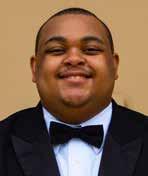
My time at FMEA is always the best time. Professionally I enjoyed sessions from job preparation and interviews, to learning the origins of the Gullah Geechee language, to preparing choreography for African pieces my choir may one day sing. Personally it’s a fantastic time to witness my dear friends and their musicianship in action and cheer them on in the process. I get to meet my old friends and catch up, while making new ones and networking, not to support myself, but my musical community here in Florida. And I look forward to doing it again each year at the FMEA conference.
TEACH MUSIC FLORIDA COALITION 2024
June 3-5, 2024 Embassy Suites USF
The Summer Institute, recently named Teach Music Florida Coalition, is an inspiring multi-day professional development training involving a relatively small number of successful, well-respected music educators. The participants address specific and relevant topics and questions, such as How do we transform music education and change our perceptions to enable us to reach all students?
In addition to engaging sessions, there is time built in for specific directed discussion and reflection.
February/March 2024 55
Frederick Blanchard, Collegiate (Senior) Rollins College Winter Park, Florida
LEARN MORE HERE
Naomi Nelson, Director of Bands Jones High School Orlando,
Committee Reports
DIVERSE LEARNERS COMMITTEE
Christine Lapka, EdD Chairperson

Five Fabulous Rules When Instructing Students Who Are Deaf and Hard of Hearing in a Music Classroom
by Cody Puckett
It is a daunting feeling when a class of students who are deaf and hard of hearing walk into your class and YOU have no idea what to do, but just know that YOU are not alone. Some music educators are unsure and doubtful about teaching students with disabilities. I work at Horizons Elementary School in Polk
County, Florida. I have the pleasure of working with a large population of students who are deaf and hard of hearing. I am an adaptive music educator who collaborates with another music educator, Mrs. Abigail Hanson. We both do our best to adapt the music curriculum for all students in a music environment.
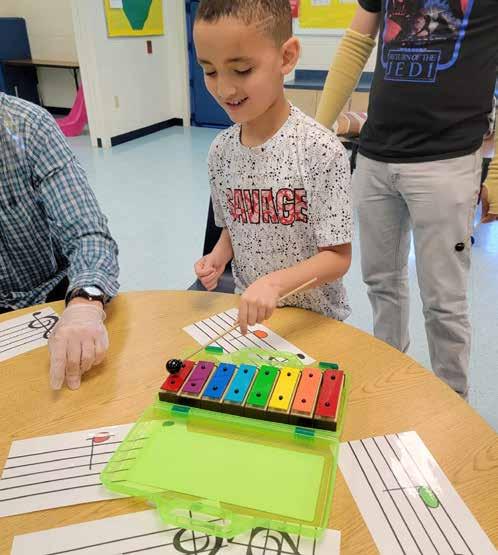
Mrs. Beth Cummings, the Polk County music supervisor, is an amazing choral educator and altogether wonderful person. When we start any music department meeting with Mrs. Cummings, she always asks, “What are the Fabulous Five Rules of music instruction?” All Polk County music educators raise their hands and say aloud: “Read, Listen, Sing, Move, and Play!” These are my five golden rules that I live, breathe, and lesson plan for:
Rule 1 – Read.
When instructing music to students who are deaf and hard of hearing, finding music that is visually appealing for young musicians can be difficult. Try to find color-coded music for boomwhackers or handbell sheet music. There are several YouTube videos of boomwhackers your students can play and visualize the music. Most of the students know the song “Flower” by Miley Cyrus (click HERE to listen). It is a great school-appropriate song for the students to sing and play along with while they watch the video.

56 Florida Music Director
Rule 2 – Sing.
Students who are deaf and hard of hearing may fall under the category of not speaking but rather communicating through American Sign Language (ASL). As the teacher, you can give your students the lyrics of the song you are learning and make it an assignment for them to sign the song, either individually or as a group, to the class. This can help engage students in the singing process, but through signing songs. I have students who are deaf and hard of hearing and students who are hearing that don’t rely on an ASL interpreter or hearing amplification. Both populations of students enjoy learning the language and singing and signing at the same time.
Rule 3 – Move.
Students who are deaf and hard of hearing are like typical students; they love ribbons, scarves, and body percussion. Be sure to explain movement with details of what you expect from the students. Communication is vital. Having an ASL interpreter in the room helps bridge the barrier between a spoken language versus a signed language. Finding the correct age-appropriate content can allow all of your students to purposefully move in the music classroom.
Rule 4 – Play.
Playing an instrument is engaging for deaf and hard-of-hearing students. When they play, they can feel the vibrations. For example, a student playing a great bass bar might feel the side of the box. In addition, because wood is a good conductor of vibration, it can be helpful to have a wooden floor or to cover a section of carpet with wood. Any instruments that students play on the floor should be placed on a floor that transmits the vibrations.
Rule 5 – Listen.
Deafness is a spectrum. Some people may hear high sounds or low sounds. Students who are deaf and hard of hearing may also have hearing aids or a cochlear implant. Both of these amplification devices can help a user properly hear what is around them. A fun way for my students to listen to songs is to hold an inflated balloon in their hands as the thin membrane of the balloon is a good conductor for vibrations. It is powerful to see their faces light up with excitement when they can feel the music. You can also give them the power to feel the vibrations by having them touch an electric guitar amp, a speaker that is playing music, a piano, or a violin. Dr. Dean Shibata (2001) discovered that
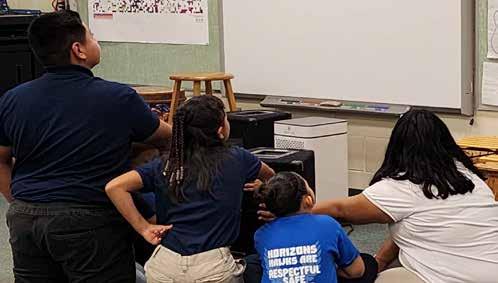
people who are deaf perceive music in the same part of the brain, the auditory cortex, as people who hear music. He concludes that feeling vibration is likely equivalent to hearing sounds. Therefore, it is important to find ways for students to feel the vibrations.
Additionally, the website Chrome Music Lab has a section called the Spectrogram that allows the user to watch different musical sounds colorfully and enhances the way someone can watch music. It is interactive, and you can even select a setting to hear yourself speak in color.

A few words of advice: Be patient and flexible, ask for help or guidance when working with your students who are deaf and hard of hearing, continue to use positive reinforcement with all of your students, and just know YOU are not ALONE! I live by the phrase “Remember to know your student’s ABILITY, not their dis-ABILITY!”
Please email me at cody.puckett@ polk-fl.net if you have questions or want to start a conversation. I am excited for you to learn and grow in the everso-fast-growing field of special music education!
Reference
Shibata, D. (2001). Brains of deaf people “hear” music. Presented at the 87th Scientific Assembly and Annual Meeting of the Radiological Society of North America (RSNA), Chicago.
Cody Puckett is in his fourth year of teaching at Horizons Elementary School in Davenport, Florida. He graduated from Flagler College with the BA in deaf education and music education and recently the MEd in special education from Florida Gulf Coast University. He is a proud advocate for inclusive music education teaching for all students and their abilities.

February/March 2024 57



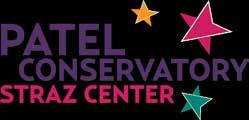

58 Florida Music Director Partners as of February 9, 2024. *Please visit FMEA.org/partners for partnership details or call 850-878-6844. SILVER PARTNERS Bornoff Foundation for the Advancement of String Education (FASE, Inc.) GOLD
Please take time to thank and support our 2023-2024 Corporate Partners.
PARTNERS




Amazing Student Tours
FloridaFundraiser.com
Head’s House of Music
Heartsong AV Services
Institute for Music Business
J.W. Pepper & Son, Inc.
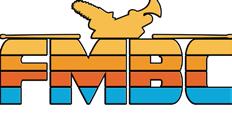


BRONZE PARTNERS
Music & Arts
Music is Elementary National Concerts
Romeo Music
West Music Company
February/March 2024 59

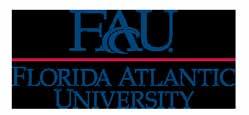





60 Florida Music Director Partners as of February 9, 2024. *Please visit FMEA.org/partners for partnership details or call 850-878-6844.
GOLD
Please take time to thank and support our 2023-2024 Academic Partners.
PARTNERS



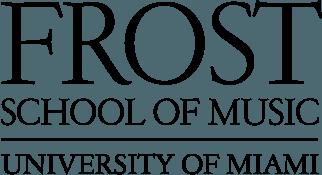

BRONZE PARTNERS
Florida Southern College
Rollins College Department of Music
St. Thomas University
University of North Florida
University of North Texas
February/March 2024 61
ExecutiveDirector’sNotes
The mission of The Florida Music Educators Association is to promote quality, comprehensive music education for all Florida students as a part of their complete education.
Opportunities Abound for Educators and Students
The2024 Professional Development Conference and All-State Concerts were very successful with 15,000-plus attendees, including performing ensemble members, parents, chaperones, and audiences. The success of the conference was due to the many hours the FMEA Board of Directors, volunteers, and partners contributed under the leadership of our president, Jason Locker; president-elect, Scott Evans; and immediate past president, Dr. Shelby Chipman. In addition, the conference planning chairperson, Dr. John K. Southall, and members of the team did a fantastic job working throughout the year helping FMEA to prepare for the conference and all-state ensembles. Great job, board members and volunteers!
In addition, I can’t overestimate the work of the people behind the scenes, Val Anderson, Dr. Josh Bula, Jasmine Van Weelden, Siena Deaton, and Richard Brown, who worked tirelessly throughout the conference to ensure everything went smoothly. A special thank you to Dr. Josh Bula for expediting registration with the use of digital registration and badge printing.
The 2024 Conference Survey closed on February 23, 2024. Thank you to members who completed the online survey for our 2024 conference. As we plan for next year, the FMEA Board of Directors and Conference Planning Committee will
work diligently to take your suggestions into account.
As the 2024 FMEA Professional Development Conference and All-State Concerts came to a close, FMEA began preparing for our 2025 FMEA conference, scheduled for January 8-11, 2025, in Tampa, Florida. Mark your calendars now. The session proposals and performance submissions are on the FMEA website. Please consider applying to be a presenter or have your school ensemble perform at the 2025 conference.
Upcoming Opportunities
w Guitar Festivals—The FMEA Guitar Festival is back with multiple sites throughout the state. Festival dates are February 17, 22, and 24; March 30; and April 4, 2024. The festival is a full day of guitar activity, including ensemble performances from elementary, middle, and high school programs. Ensembles of all experience levels perform for instant feedback in areas of technique, tone, musicality, and musical interpretation.
w Steel Band Festival—The purpose of the Steel Band Festival is to provide steel band students and directors a positive performance outlet and motivating goal, to share ensemble literature among teachers, and to create an event that allows teachers to
FMEA Executive Director
Kathleen D. Sanz, PhD

become more knowledgeable in their craft through clinician contact time, all ultimately to advance the experience of steel band students throughout the state of Florida. It will be held on March 30, 2024, at Matanzas High School in Palm Coast, Florida.
w Crossover Festivals—The FMEA Crossover Festivals are designed to encourage musical creativity, critical thinking, and collaboration by students in K-12 schools. Teachers are welcome to bring their student bands to a festival experience that will celebrate their students’ achievements in the area of cover song and original song performance. The festivals will be held in multiple locations around Florida in May, and the application deadline is March 22, 2024.
Please review information on the FMEA website for more information on how to participate and the location of each festival.
Advocacy/Legislation
The 2024 Florida Regular Legislative Session began January 9, 2024, and is scheduled to run through March 8, 2024. The legislative platform and advocacy materials are on the website. Additional information is in Jeanne Reynolds’ advocacy article in this magazine.
Have a wonderful spring semester.
Kathleen D. Sanz, PhD
62 Florida Music Director
FLORIDA MUSIC EDUCATION ASSOCIATION
Officers and Directors
EXECUTIVE BOARD
President
Jason P. Locker
Orange County Public Schools
445 W. Amelia St.; Orlando, FL 32801 (407) 317-3200; jasonlocker@fmea.org
Past President
Shelby R. Chipman, PhD
Florida A&M University, Department of Music Foster-Tanner Music Bldg., Room 318 Tallahassee, FL 32307; (850) 599-8165 shelby.chipman@famu.edu
President-Elect
Scott Evans
Orange County Public Schools
445 S. Amelia St.; Orlando, FL 32801 (407) 317-3200; scott.evans@ocps.net
FBA President
Bernard (Bernie) Hendricks, Jr.
Ocoee High School
1925 Ocoee Crown Point Pkwy.; Ocoee, FL 34761 bernard.hendricks@ocps.net
FCMEA President
Sandra Sanchez Adorno, PhD
Florida International University 10910 SW 17 St.; Miami, FL 33199 sadorno@fiu.edu
FEMEA President
Ashley Peek
Holley-Navarre Intermediate
1936 Navarre School Rd.; Navarre, FL 32566-7504 ashley@femea.flmusiced.org
Florida NAfME Collegiate President Megan Robichaud University of North Florida n01492523@unf.edu
Florida NAfME Collegiate Advisor Mark A. Belfast, Jr., PhD Florida State University mbelfast@fsu.edu
FMSA President
Christopher Burns, PhD School District of Osceola County (407) 870-4901; christopher.burns@ osceolaschools.net
FOA President
Cheri A. Sleeper
Strawberry Crest High School 4691 Gallagher Dr.; Dover, FL 33527 (813) 363-4139; cheri.sleeper@hcps.net
FVA President David Pletincks
Powell Middle School 4100 Barclay Ave.; Brooksville, FL 34609-0860 (352) 403-8437; david@fva.net
Member-at-Large
Harry “Skip” Pardee
Collier County Public Schools 5775 Osceola Trail; Naples, FL 34109-0919 (239) 377-0087; pardeh@collierschools.com
EX-OFFICIO MEMBERS
Historian/Parliamentarian & Executive Director ................................................. Kathleen D. Sanz, PhD
Hinckley Center for Fine Arts Education 402 Office Plaza Dr.; Tallahassee, FL 32301-2757 (850) 878-6844; Fax: (850) 942-1793; kdsanz@fmea.org
Editor-in-Chief Kelly Miller, DMA
University of Central Florida; 12488 Centaurus Blvd.; Orlando, FL 32816-8009 (407) 823-4545; kelly.miller@ucf.edu
Conference Planning Committee Chairperson John K. Southall, PhD Indian River State College; 3209 Virginia Ave.; Fort Pierce, FL 34981 (772) 418-9133; johnsouthall@me.com
FSMA President Jane Goodwin Jwin555@gmail.com
Hall of Fame Chairperson Mary Palmer, EdD (407) 252-5172; mpalmerassoc@aol.com
FMEA COMMITTEE CHAIRPERSONS
Advocacy Jeanne W. Reynolds (727) 744-7252; jeannewrey@gmail.com
Awards Sondra A. W. Collins sondra.collins@marion.k12.fl.us
Budget/Finance, Development Jason P. Locker Orange County Public Schools; 445 W. Amelia St.; Orlando, FL 32801 (407) 317-3200; jasonlocker@fmea.org
Contemporary Media Clint Randles, PhD University of South Florida; 4202 E. Fowler Ave.; Tampa, FL 33620-9951 (813) 974-2311; randlesc@usf.edu
Diverse Learners Christine Lapka, EdD University of Central Florida; 12488 Centaurus Blvd.; Orlando, FL 32816-2372; christine.lapka@ucf.edu
Emerging Leaders Dakeyan C. Graham, PhD, EdD, DMA Alachua County Public Schools; 3600 NE 15th St.; Gainesville, FL 32609 dregraham@gmail.com
Florida Corporate & Academic Partners Fred Schiff All County Music; 8136 N. University Dr.; Tamarac, FL 33321-1708 (954) 722-3424; fred@allcountymusic.com
Health & Wellness
Aaron Kass
Lake Nona High School; 12500 Narcoossee Rd.; Orlando, FL 32832-6922 (407) 956-8327; aaron.kass@ocps.net
Multicultural Network Arnekua Jackson, PhD Boynton Beach Community High School; 4975 Park Ridge Blvd.; Boynton Beach, FL 33426-8318 (561) 713-6851; arnekua.jackson@palmbeachschools.org
Professional Learning ...........................................................Ajori Spencer Pinellas District Office; 301 4th St. SW; Largo, FL 33770-3536 (727) 588-6055; spencera@pcsb.org
Research William I. Bauer, PhD University of Florida; (352) 273-3182; wbauer@ufl.edu
Secondary General Music Ed Prasse Leon High School; 550 E. Tennessee St.; Tallahassee, FL 32308 (850) 617-5700; prassee@leonschools.net
Student Engagement Michael Antmann, EdD Freedom High School; 2500 W. Taft-Vineland Rd.; Orlando, FL 32837 (407) 816-5600; michael.antmann@ocps.net
PROFESSIONAL DEVELOPMENT CONFERENCE
Exhibits Manager fmeaexhibits@fmea.org
Local Chairperson Jon Sever (813) 272-4861; jon.sever@sdhc.k12.fl.us
FLORIDA BANDMASTERS ASSOCIATION
President Bernard (Bernie) Hendricks, Jr. Ocoee High School; 1925 Ocoee Crown Point Pkwy.; Ocoee, FL 34761 bernard.hendricks@ocps.net
Past President Ian Schwindt Titusville High School; 150 Terrier Trail S.; Titusville, FL 32780-4735 (321) 264-3108; schwindt.ian@brevardschools.org
Executive Director Neil Jenkins Florida Bandmasters Association P.O. Box 840135; Pembroke Pines, FL 33084 (954) 432-4111; Fax: (954) 432-4909; exec@fba.flmusiced.org
Business Manager............................................................... Jo Hagan, CPA 8975 San Rae Rd.; Jacksonville, FL 32257 (904) 379-2245; Fax: (904) 379-2260; jo@barefootaccounting.com
FLORIDA COLLEGE MUSIC EDUCATORS ASSOCIATION
President Sandra Sanchez Adorno, PhD Florida International University; 10910 SW 17 St.; Miami, FL 33199 sadorno@fiu.edu
Past President Marc Decker, DMA Florida Atlantic University; 777 Glades Rd.; Boca Raton, FL 33431 deckerm@fau.edu
FLORIDA NAFME COLLEGIATE
President Megan Robichaud
University of North Florida; n01492523@unf.edu
Past President ................................................................. Colin Urbina University of Central Florida; co006947@ucf.edu
FLORIDA ELEMENTARY MUSIC EDUCATORS ASSOCIATION
President................................................................................. Ashley Peek
Holley-Navarre Intermediate; 1936 Navarre School Rd.; Navarre, FL 32566-7504; ashley@femea.flmusiced.org
Past President Joani Slawson Holy Trinity Episcopal Academy; 1720 Peachtree St.; Melbourne, FL 32901 joanislawson@gmail.com
Executive Director Jennifer Sullivan 1750 Common Way Rd., Orlando, FL 32814 (321) 624-5433; slljenn@aol.com
FLORIDA MUSIC SUPERVISION ASSOCIATION
President Christopher Burns, PhD School District of Osceola County (407) 870-4901; christopher.burns@osceolaschools.net
Past President Lindsey R. Williams, PhD Seminole County Public Schools (407) 320-0434; willialz2@scps.k12.fl.us
FLORIDA ORCHESTRA ASSOCIATION
President.......................................................................... Cheri A. Sleeper Strawberry Crest High School; 4691 Gallagher Dr.; Dover, FL 33527 (813) 363-4139; cheri.sleeper@hcps.net
Past President Laurie Bitters
Winter Park High School; 2100 Summerfield Rd.; Winter Park, FL 32792 (407) 622-3200; laurie.bitters@gmail.com
Executive Director Donald Langland 220 Parsons Woods Dr.; Seffner, FL 33594 (813) 502-5233; Fax: (813) 502-6832; exdirfoa@yahoo.com
FLORIDA VOCAL ASSOCIATION
President David Pletincks Powell Middle School; 4100 Barclay Ave.; Brooksville, FL 34609-0860 (352) 403-8437; david@fva.net
Past President Jeannine Stemmer Florida Christian School, 4200 SW 89th Ave.; Miami, FL 33165 j9stemmer@floridachristian.org
Executive Director Michael Dye 231 S. Bayshore Dr.; Valparaiso, FL 32580 (850) 217-7419; mike@fva.net
Business Manager Jo Hagan, CPA 8975 San Rae Rd.; Jacksonville, FL 32257 (904) 379-2245; Fax: (904) 379-2260; business@fva.net
CENTER FOR FINE ARTS EDUCATION
402 Office Plaza Dr.; Tallahassee, FL 32301-2757 (850) 878-6844; Fax: (850) 942-1793
President Kathleen D. Sanz, PhD (kdsanz@fmea.org) Director of Operations Valeria Anderson, IOM (val@fmea.org)
Technology Director Josh Bula, PhD (josh@fmea.org) Marketing & Membership Coordinator Jasmine VanWeelden (jasmine@fmea.org)
Administrative Assistant Siena Deaton (siena@fmea.org)
AFFILIATIONS



February/March 2024 63
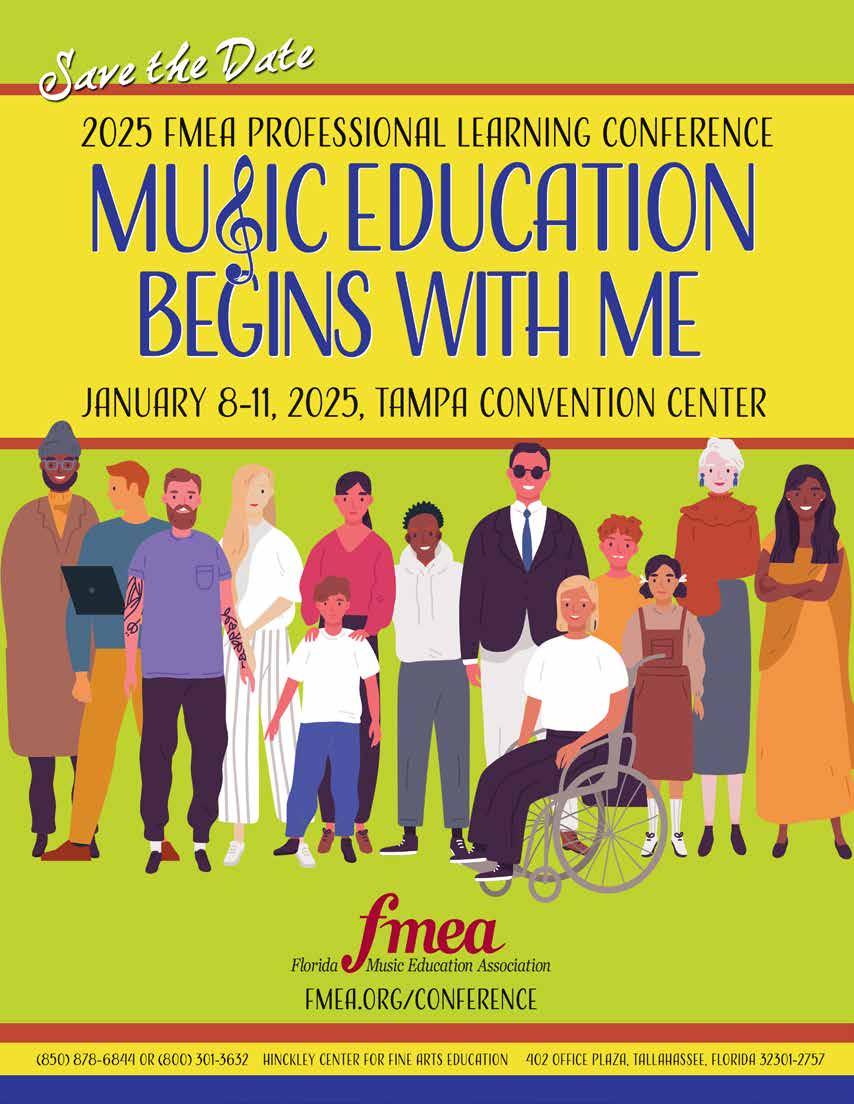


















 Jason P. Locker, President Florida Music Education Association
Jason P. Locker, President Florida Music Education Association






































































 by Kaleb Switanek
by Kaleb Switanek































































